#should I put my other death island post in bold with what things are happening? so people don't have to check the notes?
Video
youtube
RESIDENT EVIL: DEATH ISLAND | OFFICIAL TRAILER Extended (2023)
I needed to share this
Jills trauma at the hands of Wesker is getting addressed
so many things are happening but that’s the important one (along with Redfield sibling team up)
kinda of excited honestly
@precambrian-sea-pancake @zannolin @screechthemighty I hope you all don’t mind the tags
#youtube#resident evil death island#should I put my other death island post in bold with what things are happening? so people don't have to check the notes?#rant in the tags#don't look in the comments of this video though where i got to was ethan is boring and his games aren't part of the timeline and of course#bring back og character for RE9 even though RE9 woud mean they're older than fifty#specificlly one guy with youtube handle called seven#claire redfield#will re fandom accept that if it weren't for ethan and re7 doing so well we wouldn't have gotten the remakes? probably never#leon s kennedy#chris redfield#jill valentine#rebecca chambers#probably#ellie rambles in the tags#ellie rambles
9 notes
·
View notes
Text
the siren, act i: serenity |p.p. / part 2|

[part 1] [part 3] [part 4] [part 5] [part 6]
moodboard credit to @candycornparker
special thanks to @rainbow-marvel for always being willing to edit my thinGS!!!
to listen to the sea shanty i have drawn minimal inspiration from, click here
SUMMARY: When merchant ships start mysteriously going missing, Tony Stark enlists the help of Peter Parker to discover what could possibly be causing them to vanish from thin air. Unbeknownst to them, some mysteries go deeper than the sea itself.
PAIRING: Peter Parker x Siren!OC
WORD COUNT: 1.5k
a/n at the end.
Sister… where are you going?
I am going to the surface to retrieve sunlight for my bones.
Come back soon…
She had always preferred the surface.
All of her purebred sisters spent their days lounging on the depths of the ocean, remaining out of sight until unsuspecting humans intruded their home. A single finger over the perimeter of their territory and death became their fate. The farther she could get from her sisters in all of their evil glory, the better she felt. Even if the sunlight made her eyes hurt and her skin dry, it was the closest she could get to solace.
Existing was absolutely dreadful, and there was no delicate way of putting it. From the moment she was conceived, she was doomed to have a miserable life. Her mother had taken a risk by bringing her into this world, little did she know that the daughter paid the price for the mistakes of the mother. To be blunt, she hated her parents. She hated both of them. Their recklessness and stupidity had turned her into the shell of a seiren she had become. The only reason she was alive was because she did not have the means to change that.
...
Once upon a time, over half a century ago, her mother had fallen in love with a human male. The concept was an ancient one; every seiren from the beginning of eternity had a peirasmós. One human would tempt them to reject the ways of their sisters. If you were worthy, you would kill them as you would any other human. If you were not, you would be murdered along with them. Never once had there been one to reject their kin, until her mother discovered the shipwrecked man barely skimming the perimeter of seiren waters.
The seiren did not like to kill. Creating life was always more miraculous than taking it. Their secrecy was sacred. No one from land should ever have the precious knowledge of their existence. When men took to the sea, there was no doubt to their ancestors the path they would take. The melodic trance became a powerful weapon against the weak human mind, and eventually, the seiren became a whisper of a rumor. A legend. A fairytale.
She did not know why her mother failed the test, or how she spotted him before his presence was made known to her sisters. From what her own sisters had told her, she dragged his mutilated body to an island that night and laid with him, having no qualms regarding the ancient practice that had been brutally violated. Her terrible soul kept him well, nursed him back to health. She allowed him to know her from the inside out, rather than trick him to falling for her. She put the love of a man before the love of her sisters. Worst of all, she carried his child for 273 days, until she birthed in the spring. That was when she was finally discovered.
They showed her endless mercy by sparing the life of her child. For it was not the child who had sinned, it was her mother.
There was not a day that went by where she was not reminded that she was never supposed to have been born. It was drilled into her head that she would never follow the footsteps of her wretched parents. With thin rope they acquired from a ship they took down, they bound the base of her tail and the center, so that even when she dried and her form switched to limbs, walking would be quite impossible. It was so tight that the only way it stayed was a curse of some sort. Only an outside source could remove it. She would be punished if there was ever an attempt to walk.
Every evening, around the time that the sun was on the brink of going down, she breached the surface and stared at the sky. Her sisters never understood why she was so detached from them; To her, it was blatant their cutting comments would never put a dent in their emotionless shells. To them, they spoke the truth. Their intent was never malicious. Unfortunately, the human half of her was filled with intense emotions that a pure seiren only had to feel in the face of her peirasmós. She endured these human feelings at every hour of every day. She wondered if this was how being fully human was. Did they have a similar weight beat them down?
...
When she breached the surface of the water, the atmosphere was different. She looked into the eyes of a metal bird that she had seen before, but they never had been this close. The menacing birds had always minded their own business, keeping their distance and passing by. The longer she stared at it, however, the sooner she felt the presence of humans: two female, two male. If she were on the bottom of the ocean amongst her sisters, these humans would have gone completely undetected. Maybe that was their prerogative.
One human, dressed in strange red clothing, crawled along the side of the metal bird. Was this normal human behavior? She had never seen any move in that manner. She shut her eyes, hoping he did not see her and continued to float. If he touched the water, her sisters would be notified, but for now, she let them mind their business. Too many lives had already been lost, too many necks torn to shreds by her canine fangs. If she could preserve these four, she would.
Something was different about these humans. One specifically. A wave of intense feelings, one she had never felt before, crashed into her. She stared at the red one, the pulse in her chest growing quicker with every second. An image of her mother and father appeared, her eyes snapping shut. Somehow, she viewed them from an outside perspective, but the harder she tried to see the intricate details of her mother’s face, the more she was only able to see herself.
When her eyes opened again, the red human was dangerously close to her and the surface of the water, suspended upside-down. She opened her mouth, almost instinctively, and sang a sea shanty, willing it to do as she instructed. She was almost certain that she was the first seiren to use her trance to keep someone from entering the sea, but the feeling sitting in her chest forced her to frantically keep it from putting itself in danger.
My heart is pierced by Cupid.
I disdain all glitter and gold.
For nothing can console me,
but my jolly sailor bold.
She stopped singing, and an idea sparked in her brain.
Do not touch the water unless you seek to be greeted with death.
She used a similar channel that her sisters communicated with, except it was a closed line between her and this strange looking human. It was in her native language, but somehow she knew he had understood. She continued the sea shanty, one that was hardly ever used. Generally, the melodies they sang were vowels, and the tune improvised. Centuries of listening to pirates and sailors had given them an archive of songs, but it was deemed insensible to use them. There was no need to use the human formed words that they had no way of understanding. Even though she did not know what she was saying, she liked the way they felt in her mouth and she progressed on.
It reached out its hand, trying to touch her face. It was under her spell, but she stayed at a distance, not wanting his hand on her. She pulled down the clothing item covering its face, knowing that it was the least of its concerns. By the way his jaw was set, she knew he was male. Lips, nose, eyes, then-
Love.
An insurmountable force felt like a boulder had been dropped on her, a connection so deep that now, all that mattered was him. It touched every nerve in her body, from the tips of her delicate fingers to the end of her tail. She pictured the endless possibilities, their great escape, their eternal life together. With one kiss, they could hold a bond unlike any other. The kiss of a seiren was the equivalent to eternal life.
But then, despair.
Her face convulsed, and she was unable to stop the tear from rolling down her face. There was no possible way that any of that could ever happen.
For the first time in her dreadful 63 years of life, she finally forgave her mother. The intense amounts of hatred she let carry her dissipated, and another tear just about rolled down her cheek.
Just about, if it weren’t for the electric shock, and the plunge into complete darkness.
AN: Feedback, good or bad, always appreciated. Send me an ask or reply to this post!
M A S T E R L IS T
CLICK HERE TO BE ADDED TO SERIES TAGLIST
T A G L I S T
@tinkeringtony @plushparker @spideyboipete @darlintom @vinndetta@starksmile @pumpkinsandparker @upsidedownparker @m4shtyx @quietgeekygirl @bigunknownpolice @butwhyduh @shamelessbookaddict @spiderlingsweb @mendes-vuitton @roses-hxlland @sectumsempra-beaches @tomsfireheart @pbnjparker @saturn-aka-six @tomhiddleston-is-myboo @nasa-parker @starksparker @ohhparker @lovelyh0lland @blushypeter @spxcxrrxid @starkravingparker @eyyyyyyyyyyyyyyyyyyyyyyyyyyy @petalparker
{let me know if you are a mutual who wishes not to be tagged in this series}
#alliecat writes#peter parker#peter parker fanfiction#peter parker fanfic#peter parker x reader#peter parker x you#peter parker x y/n#peter parker x oc#tom holland#tom holland fanfiction#tom holland fanfic#tom holland x reader#tom holland x you#tom holland x y/n#tom holland x oc#peter parker x original character#tom holland x original character#spider man#spider man fanfiction#spider man fanfic#spider man x reader#spider man x you#spider man x y/n#spider man x deadpool#spider man x oc#spider man x original character#marvel#mcu#marvel cinematic universe#marvel comics
187 notes
·
View notes
Text
What happened to Sherlock? Part VII – The Importance of Being Earnest (2)
This is the direct (and lengthy) continuation of Part VII in my meta series “What happened to Sherlock?”. You can find the first post of this installment here. I’m now going to continue testing my Hypothesis #7, which goes like this:
Hypothesis #7. By TFP Sherlock has managed to figure out some essential things about John and the importance of staying alive, and he has managed to get in touch with his own repressed emotions.
In the first post I tried to verify the two first statements of this hypothesis, and here I’ll focus on the third statement about repressed emotions. After the hug in TLD, Therapist!Sherlock (assuming Eurus=Sherlock) thought that John felt ‘so much better’. But then Detective!Sherlock noticed that something was still wrong; his client seemed to be channelling Satan and Faith’s note was actually ‘real’. The scenario ended with Therapist!Sherlock shooting John in the face, but in TFP we learn that this was done with a tranquilizer, so John survived. Which brings us right into:
Prediction #2: If Hypothesis #7 is true, Sherlock will have to confront his childhood trauma and the context where he chose to repress his emotions.
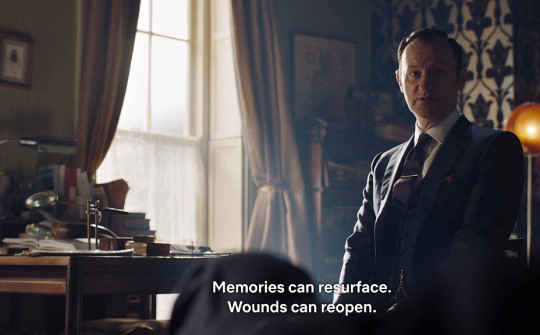
Sherlock really needs to stay alive for John’s sake. But how can you stay alive when Emotions are killing you? Sherlock might think the only solution is to bring them on and face them, try to beat them ‘in a death-defying act’. Which means Sherlock must go deeper still into his own mind, to face his demons.
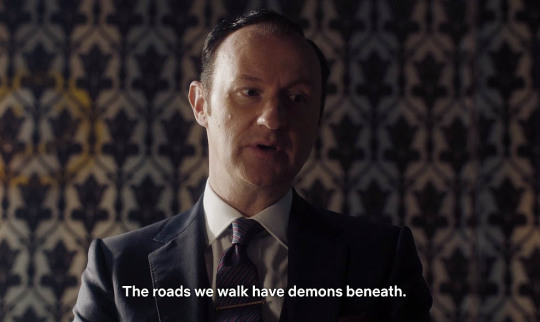
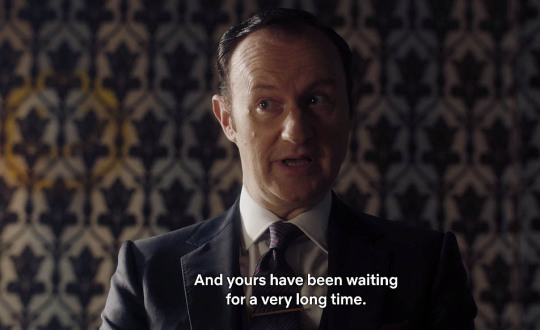
i actually think this is the single bravest thing Sherlock does in the whole show this far. And in order to face his demons and traumatic memories, he needs to perform his Mind Theatre experiments on himself. But who’s the scientist then - who is setting up the experiments? I believe this is done by Sherlock letting someone impersonate a side of himself that he has been hiding and neglecting for a very long time, and who therefore appears to be a cold, calculating psychopath to be feared and avoided: Sister Sentiment.
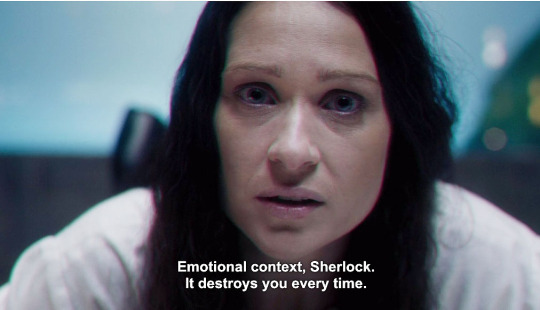
@beingallmysterious said it in their very brilliant meta about Eurus representing Emotion (my bolding, the link also contains the additions):
“The final problem then is reason vs sentiment. How do we live with emotions? Should we lock them up as Mycroft recommends? Sherlock has tried this and it didn’t work. So what’s Sherlock’s solution in the end? He lives with her. He accepts her. He becomes whole again. Reason and sentiment”.
This is, basically, what I think TFP is about. Sherlock might believe he has to defeat and disarm Eurus, but this story tells him (and us) that he rather has to embrace her, accept her as a valid part of himself. So let’s keep on running the scenarios.
TFP, Scenario 1: What happened back then?
Inspiration: It seems like this scenario starts when Mycroft is forced to talk about his and Sherlock’s upbringing and their ‘lost sister’ Eurus. We go back to their childhood and the mansion where the Holmes family used to live. So some of this might be based upon Sherlock’s real memories. But there’s also a resemblance to certain horror movies, which I doubt is a coincidence. I rather believe this is Sherlock’s way of deflecting traumatic memories he’d rather not get into. He uses characters from these movies as ‘actors’, with scary, supernatural powers representing Eurus, such as Orphan:
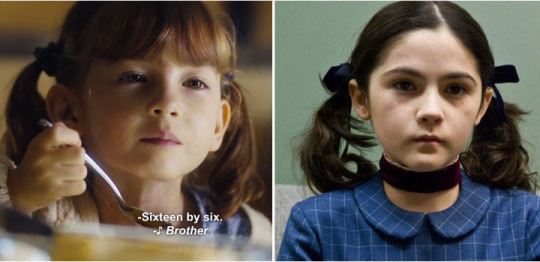
Or The Ring:
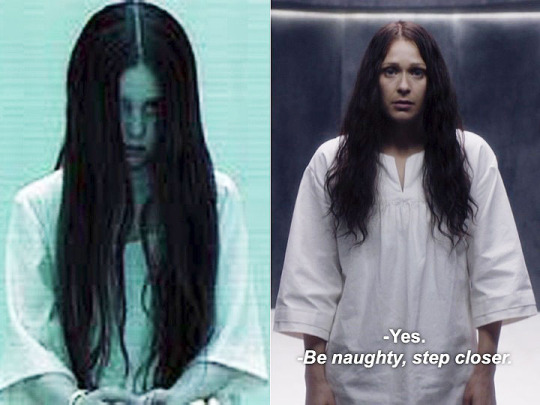
As a bonus, this girl from The Ring (Samara is her name, by the way) also happens to come out of a well (see discussion on the 5th scenario of TFP at the end of this post) and she climbs through the screen of the telly, a bit like Eurus slips through the suddenly non-existent glass wall at Sherrinford.
[Running a scenario where Sherlock and John scare Mycroft into telling the truth about their childhood, when Sherlock used to play pirates with his dog while little Eurus played alone, and they had ‘honey for tea’ at Musgrave Hall. But Eurus seemed to want Sherlock dead and set the mansion on fire, and in present time 221B gets blown up by Eurus’ ‘patience grenade’]
Result: We learn that little Eurus (=Sherlock) set the house on fire and was then ‘taken away’ to some un-named ‘suitable place’, where she started a new fire. And then Uncle Rudy ‘took care of things’; she was declared dead but secretly sent to Sherrinford. In spite of all the absurd creepiness (bizarre clowns, explosions etc), present day Sherlock’s search for his sister leads them to Sherrinford, an isolated prison island way out at sea, where she is (supposedly) locked up. And since John was only sedated at the end of TLD, he’s now with Sherlock again. But well there, the nightmare continues; Sister Sentiment takes over their free will pretty quickly.
Discussion: @sagestreet has made an interesting analysis based on the idea that the memory sticks that keep popping up every now and then in the show represent Sherlock’s “’lost’ memory (about his traumatic past and subsequently repressed gay identity)” @sagestreet theorizes that this ‘lost’ memory might be based on the experience that ��Sherlock’s dad was in a gay relationship with his best friend and something went very, very wrong”. And, furthermore, what if this friend was ‘Uncle Rudy’, possibly the brother of Sherlock’s mother?
This idea would be interesting to explore further, and I replied to @sagestreet‘s meta with some more speculation: A triangle drama like this might have had an emotional impact on the kids, perhaps enough to make the older Mycroft ‘abandon’ his own feelings and try to make his little brother do the same. But if little Sherlock (=Eurus) had a too emotional personality to even manage to distinguish one feeling from the other in this mess...
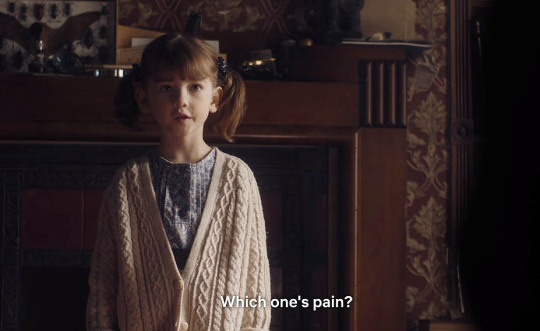
...he might have confused the situation of jealousy, guilt, anger, betrayal etc. in the family with his Dad’s sexual orientation. And it all might have been mixed up into internalized homophobia, where Sherlock would blame himself for having the same kind of feelings as his Dad, which would make him think he risked dragging others into pain and misery.
So what did actually happen? I don’t think we (and Sherlock) really get the answers in TFP, but we do get to feel some of the emotions connected to it, and that’s at least a beginning. Was there a suicide in Sherlock’s family, connected to a possible triangle drama? Or was an impending ‘scandal’ with secret-keeping in a chaotic family situation enough to mess up Sherlock’s emotional life? Was young Sherlock sent to a boarding school? Mental institution? Well, I do hope S5 will offer satisfactory answers to this.
TFP, Scenario 2: Is caring an advantage?
Inspiration: I think this is a key question for Sherlock, something he has been mulling over since he realized that his attitude doesn’t sit well with John, and maybe was the last straw in making John abandon him for someone else. John has been questioning Sherlock’s humanity at least since TGG, and possibly even earlier. If Sherlock did indeed ruin himself on drugs while reading John’s blog after the wedding (as I suggested earlier in this meta series), I think it’s relevant that this is how he came across on the blog after TGG:


So yes - this is one of the main problems that Sherlock needs to investigate in his Mind Theatre to find out what went wrong between him and John.
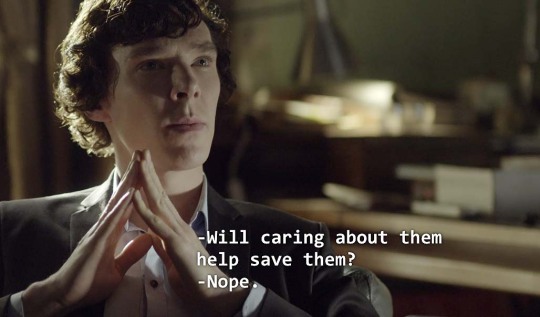
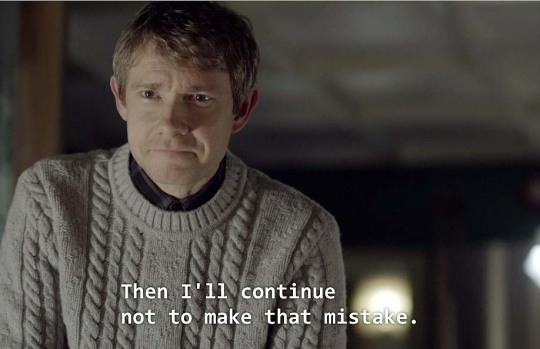
But Sherlock’s statement is contradictory (which I believe John tends to miss, at least consciously). Because trying to save people’s lives already means caring. Sherlock’s actions prove that he already does care about people - why otherwise would he work on crime solving? There are many less humanity-serving ‘games’ he could play and puzzles he could solve to keep himself entertained. So Sherlock definitely does care, but I think his real problem is that he doesn’t permit himself to feel it. Because feeling compassion means exposing himself to other people’s suffering - and his own. Sister Sentiment will make him suffer.
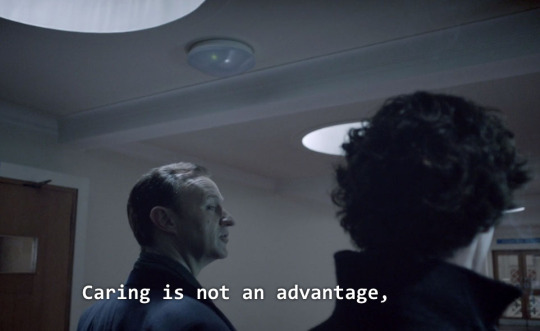
This is what Sherlock has been told, probably by Mycroft, in an attempt to protect his overly emotional little brother from the cruelty of life. The question is, though: Not an advantage for whom? Caring certainly is an advantage for the people you care about. It’s just that it might make you suffer.
[Running the scenario. For the first time in this story Sherlock exposes himself to his own experiments, rather than someone else. These are ethical dilemmas and he finally gets to the point where he’s sincere enough with himself to really face these demons. Because he used to hide from them before, which has deprived him of John. And - as @beingallmysterious said in their meta about Eurus - this is what Sentiment does to you: “Eurus puts Sherlock through torturous mind games. Doesn’t emotion do the exact same thing?” ]
Results and discussion: In Sister Sentiment’s first experiment Sherlock is supposed to make John shoot the Governor of Sherrinford, supposedly to stop Eurus from murdering his wife (which reminds me of a manipulation scheme from the mentalist Derren Brown (X). In his show ‘Push’ Brown tries to manipulate a guy, by group think and submission to authority figures, to ‘commit murder’ and push someone off a building). Sherlock seems very pragmatic about this; we don’t see him hesitate and he’s not even trying to refuse. He keeps playing entirely 'by the rules’:
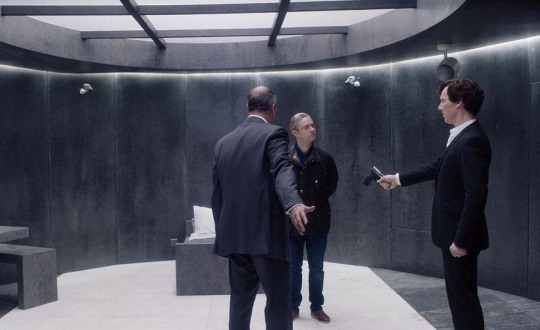
But what if the ‘rules’ are wrong? I think this mirrors how Sherlock, in a way, made John shoot the cabbie through the window in ASiP. If Sherlock had turned in the serial killer to the police instead of joining him to play mind games and prove himself clever, John wouldn’t have had to kill a person, which is a heavy weight to bear. In this scenario it gets clear that John doesn’t want to shoot someone, not even for the ‘greater good’. And in the end the Governor shoots himself to save his wife (who subsequently gets shot anyway). But the link to ASiP is clearly there, in my opinion; why else would they show us this bullet hole, which very much resembles the one where John shot the cabbie?
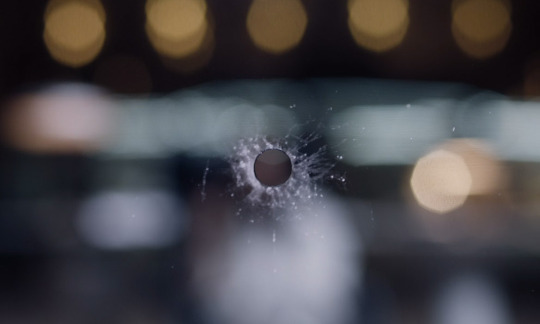
The next experiment is the three Garrideb brothers who are kept tied-up and dangling over the abyss. This is (supposedly) about solving a crime puzzle, and Sherlock quickly deduces who of the three brothers had committed the murder. But it doesn’t matter to Euros who the guilty is; she kills all three Garridebs anyway. Which resembles the result when Sherlock in TGG focuses a bit too much on the puzzles, without considering the victims (which enrages John). The blind lady had to spend a long time suffering in complete agony, so maybe she could no longer think clearly and started describing the criminal, who then detonated the bomb. Caring about the victim might have been an advantage for solving the case, and I think the important thing was that Sherlock’s cleverness wasn’t enough; the lady and a whole lot of other innocent people died anyway. But at least his compassion might have lessened the time of suffering for the victim. What would have happened if Sherlock had refused to condemn any of the Garridebs? We don’t know, because he thought he could save two of them by solving the puzzle and condemning the guilty one.
In the end it didn’t matter what Sherlock’s brain told him to do in these ‘experiments’; the victims died anyway. Which means caring about them at least wouldn’t have hurt. But I have a feeling that showing compassion in TGG would have solved much of the communication problems between Sherlock and John. Which I hope Sherlock finally begins to understand after TFP.
TFP, Scenario 3: What will happen if Sherlock confesses his love to John?
inspiration: I think this is one of Sherlock’s hardest tasks, because he has nothing to draw from. I think he knows - subconsciously - from TLD that he can’t bring John to ‘confess’ his feelings for Sherlock, unless Sherlock takes the first step. But having repressed his feelings for so long, this isn’t easy for Sherlock. He needs to learn to say the words, yes, but this isn’t enough; he has to actually mean it. Because if he tries to fool John in any way (like he cowardly did in the underground case in TEH), or slip away from it as in the Tarmac scene in HLV, it’s only going to hurt John further and destroy his trust. So that’s why I think Eurus (=Sherlock) sets up this experiment. He needs Molly as a mirror for John, because he isn’t ready to admit this to John’s face just yet.
[Running the scenario, involving a phone call to Molly with a threat of blowing her up if Sherlock can’t have a confession from her]
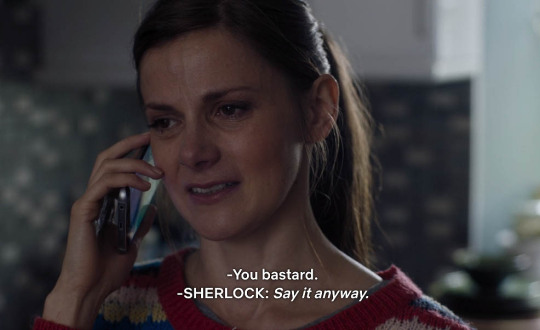
Result: It turns out that Molly (=John) won’t have any of this BS any more; it’s time for Sherlock to come clean.
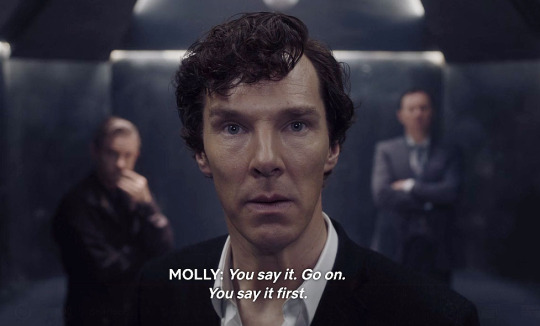
This is not about protecting John, or any other practical or ‘external’ reason for committing to him. It’s the point of no return, the moment of pure and simple honesty. “Tell John the truth” – that’s the mission. And finally, he does.
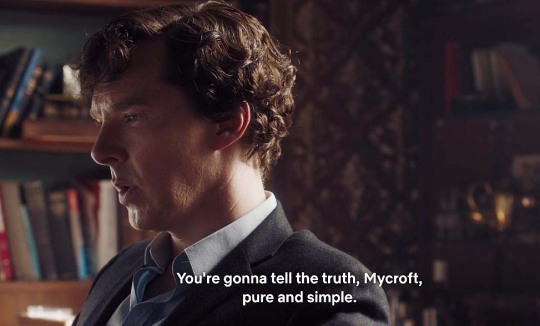
Discussion: This scenario is where I think the quote from Oscar Wilde might come in handy.
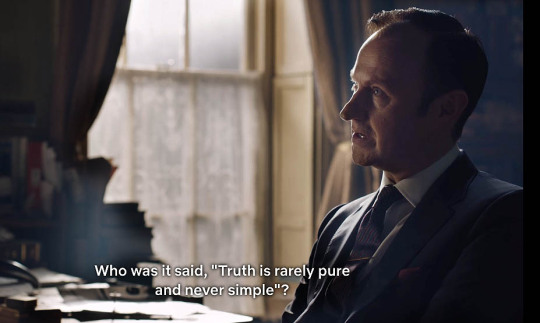
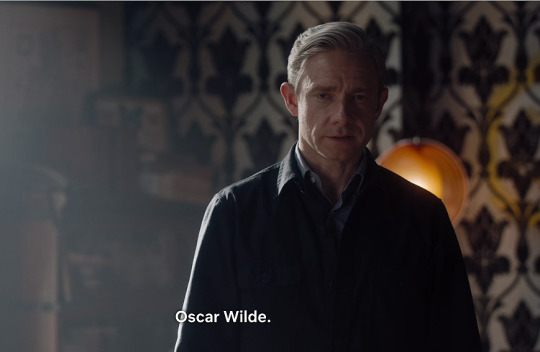
The title of the story that John, Mycroft and Sherlock are talking about is ‘The importance of being Earnest’. I’m not a native English speaker, but the word ‘earnest’ has several meanings, as far as I know. For example serious-minded, solemn, sober. But also heartfelt, sincere and impassioned. And Earnest is also the (false) name of the two protagonists in Wilde’s story, hence the wordplay in the title. In this work, Wilde is depicting two friends that keep lying about who they really are and what’s their real name, in order to escape social obligations. But the subtext is quite loud that this is rather about their relationship than the women they are (supposedly) courting.
The play premiered in London in 1895, the same year as Oscar Wilde was imprisoned and sentenced to two years of hard labour for “gross indecency” (= basically for being gay). And also the same year that has been re-hashed in this show since John’s blog got stuck on 1895 hits in ASiB.
Anyway, this scenario is a key point; it’s where I believe Sherlock finally breaks and starts allowing himself to feel and react emotionally. Sherlock sees 'I love you’ as a defeat and Eurus tells him that he has made more harm than good. But I think he’s on the right track now, because he’s letting himself feel.
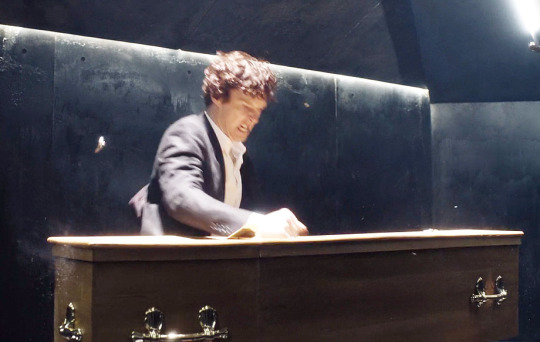
And smashing the coffin might mean that he has actually found the way to save John Watson. Save him from suicide, because that’s what I believe the coffin means, symbolically: the death of John.
TFP, Scenario 4: Heart or brain?
Inspiration: I’m not sure where exactly Sherlock draws from with this one, but this seems to be a nagging question that he has been wrestling with for some time now. In Eurus’ fourth experiment in Sherrinford, Sherlock still keeps playing the game on her terms, by accepting to choose between John and Mycroft; metaphorically heart vs brain. It seems like Sherlock has to either keep his brilliant brain and cut off his heart again, or go by his heart, which will make him lose his head and go insane.
[running the fourth model, involving a gun and a choice]
Result: For a moment, it looks like Sherlock is actually going to choose the heart option and shoot Mycroft, who tries to provoke him to do this. But Sherlock now - for the first time in this story - skips the game and goes for a third option instead: killing himself. Again. Which seems to very much be Moriarty’s (= homophobia’s) goal with this.
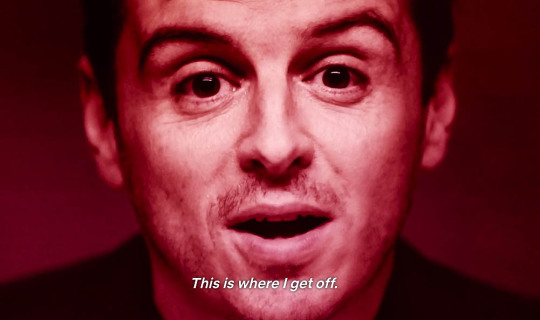
But it doesn’t work, because taking his own life is not the solution Eurus wants, so she doesn’t let him. Sherlock gets sedated, and his choice (to keep both brain and heart) only leads to another prison, where he’s surrounded by old family photos and a dog bowl (=memories). But breaking free from this and solving the Musgrave Ritual is (apparently) the solution.
Discussion: This choice could have been lengthy, but since Eurus (=Sherlock) aborts this scenario rather quickly, let’s just jump to the next one.
Scenario 5: How can Sherlock find the Truth?
The little girl on the plane, whom Sherlock has been trying to communicate with since early on in the episode, is lonely and desperate, and Sherlock is supposed to talk her down, to guide her towards the ground so she can land safely. But we also know that Mycroft (=Sherlock’s brain) was actually planning to let her crash the plane ‘for the greater good’ of other people’s safety.
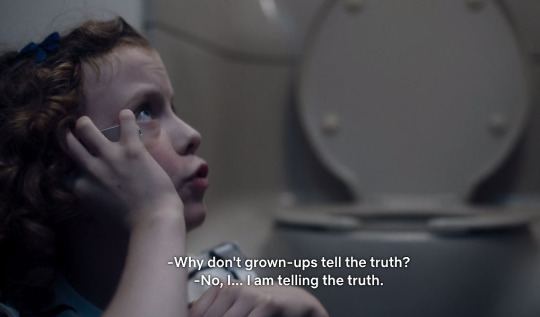
So, are you telling the truth, Sherlock? I’m not so sure about that actually... And did the grown-ups really tell you the truth about certain things when you were a kid? You do seem to doubt it.
Inspiration: Well, once again I suspect that Oscar Wilde might have been an inspiration for this experiment; “Truth is rarely pure and never simple”. But the girl on the plane might also be very much representing how Sherlock is feeling; he might have been withhold truth in his past, so he opted to seek for it himself, always, by using his brain and powers of deduction. But he feels alone and scared, up in his ‘ivory tower’.
[Running a scenario involving a puzzle based on Eurus’ song; is it the solution to this puzzle?]
Result: The little girl is, it turns out, actually Eurus (=Sherlock), who is feeling lost high up in the sky, unable to land with a sleeping driver. Finding Eurus’ “room” by solving the song puzzle means finding the truth. Which means Sherlock can finally save John from the well he’s drowning in.
Discussion: [Ironically enough, in the midst of all this (righteous) rage over the big ‘Purge’ of tumblr, I stumbled over something that I wonder if it’s not a double irony? Or a triple irony?
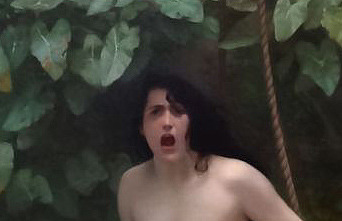
The thing is, that seeing this post about the tumblr censors flagging a 19:th century painting of the “Truth coming out of her well to shame mankind” (X), actually happened to give me something of an epiphany.]
This painting is from 1896 and it’s made by the French artist Jean-Léon Gérôme. You can read more about Gérôme’s work and see this and other of his paintings in this article here. This is the story (my bolding):
“At this time, Gérôme painted a series of works showing the personification of Truth. First, she was shown as a nude at the bottom of a well, either lying on the ground, or standing with a mirror in her hand.”
“Truth Coming out of her Well to Shame Mankind (1896) is based on a quotation from Democritus, “Of a truth we know nothing, for truth is in a well” (or, more literally, ‘in an abyss’), but knowing that reference is of little help in understanding these paintings. Gérôme had given one of the earlier paintings the title of Mendacibus et histrionibus occisa in puteo jacet alma Veritas, which translates as ‘The nurturer Truth lies in a well, having been killed by liars and actors’. In this last version, she has climbed out of the well, and instead of bearing the customary mirror, she brandishes a whip with which to scourge us.”
How many mirrors have we seen in this show by now? I think I lost count already in the unaired Pilot, but I wood guess at least some 50-ish. The point I want to make here, however, is that I believe the Truth Coming Out is central in BBC Sherlock. And in this fifth scenario we have two characters that are trapped in a well, keeping Truth hidden to the world:
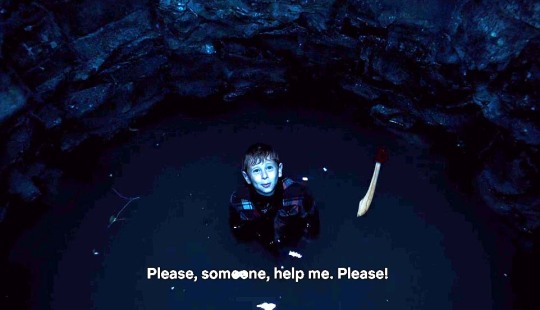
Young Victor Trevor (Sherlock’s mate from college in ACD canon)...
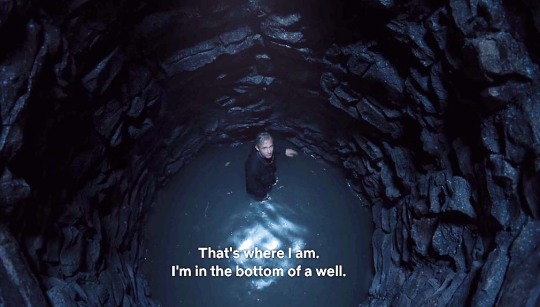
...and adult John Watson.
One of them never came out; he was ‘killed by liars and actors’, people who refused to see the Truth. So something might have happened with Victor, which contributed to Sherlock shutting down his emotions.
But the other one did come out, didn’t he?
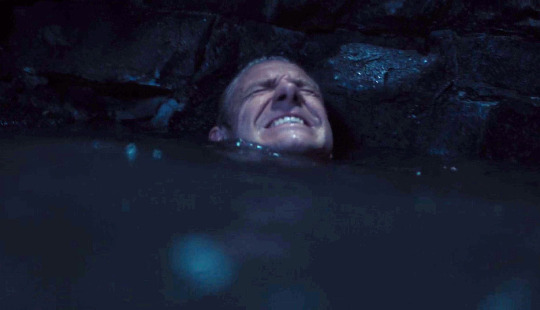
He literally did come out of his well, and he did it with Sherlock’s help. John isn’t exactly naked at the end of TFP, and he isn’t brandishing a whip (that’s Sherlock’s job - right? ;) ), so apparently John isn’t going to shame us. But John is indeed Sherlock’s Truth. If Sherlock is honest with himself, if he’s earnest, i think he must sooner or later admit exactly what John means to him. And John is wearing a blanket, just as Sherlock was after John Saved him in ASiP.
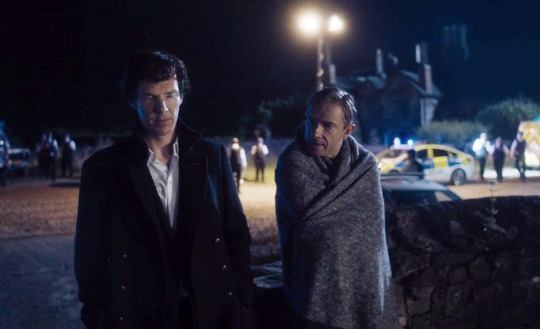
So if John is going to come out in S5, I think it’s perfectly foreshadowed here. And if he does, he’ll bring Truth with him, the true character of their relationship (which is also signaled by the codes of this episode). But it has to be with Sherlock’s help; Sherlock needs to take the first step to help him. This is the first time in S4 that Sherlock actually seems to manage to save John Watson. And he solves the puzzle by realizing that the girl on the plane is Eurus, who desperately needs a hug. Sherlock needs to embrace his own emotions, be OK with them and let them exist at the pair of his rational thinking.
Scenario #6: Does it matter who you really are?
Inspiration: A DVD is in focus here - not a memory stick this time - and it carries a message from ‘Mary’, just like the one at the end of TST, and the ‘unsolved’ (stabbed) case on Sherlock’s mantelpiece in TLD. But should Sherlock actually listen to her?
[The last scenario is a sort of ‘epilogue’ to the events in Sherrinford, where things seem to have ‘straightened up’ again.]
Result: After Musgrave, Eurus is locked up in Sherrinford again; apparently Sherlock still considers his emotional self as being too dangerous to let loose, and now she can’t even speak any more. But we also see Sherlock in a process of healing; he rebuilds 221B with the help of John, and he starts meeting Sister Sentiment regularly, communicating with her directly through the violin. And, as @loveismyrevolution commented here, the beautiful piece they are playing together is called “Who you really are”(X).
“What I try to say is that Sherlock’s emotions are that intense that they must be kept in charge and they are still locked within himself (Sherrinford), but he’s aware of them, is in contact with them, acknowledges them to the outside world and it makes him whole again”.
Discussion: 221B now has a slightly new dressing; some furniture have more rounded edges, and there’s an infant to take care of. Sherlock and John both seems happy with this. Both Greg and Molly pop in, and apparently Sherlock and John are solving crimes together again. But why is Mrs Hudson going around spraying the flat with aerosol?
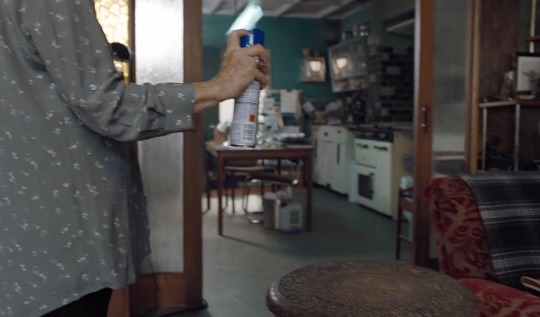
The last (and only) time we saw aerosol in this show was the poisonous, fear-inducing fog at Baskerville and Dewer’s Hollow in THoB. Does this mean that the poisonous homophobia is still around? (I’m going by the metaphors in @sagestreet‘s Follow-the-dog meta here, that the hallucinogenic fog in THoB represents homophobia). Well, to me it definitely seems so, since this important issue still isn’t addressed - far from it, actually. And what about Sherlock facing Death (=Appointment in Samara)? The skull on the wall still seems to be glowing in one of the dull colours it was displaying before 221B got blown up, and John still appears concerned:
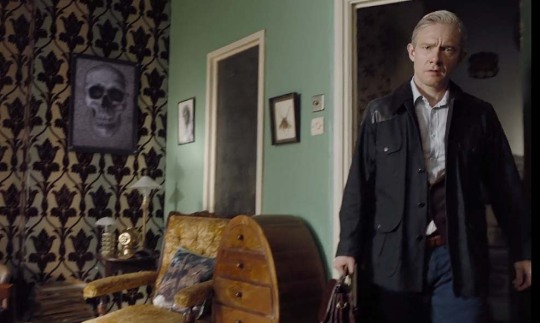
While I still believe, on both the meta level and as in-show ‘reality’, that the Holmes character is dying, at least Sherlock now seems to have faced his demons and thereby got in touch with his own, buried, emotions. But the scenario is very much dominated by ‘Mary’, whose message is two-edged:
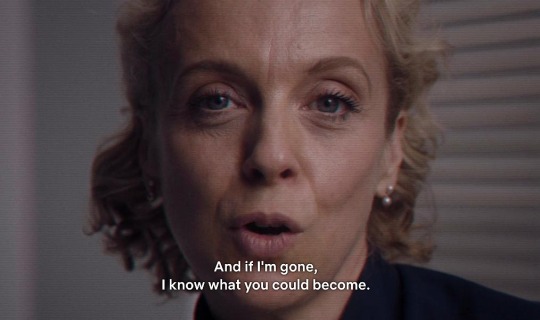
On the one hand she is hinting at what John and Sherlock could become without her. But on the other hand she claims that it doesn’t matter who they really are, and then she calls them “My Baker Street Boys”. Which I take to mean, that we could have our Holmes character two ways: Either we can keep it on a closeted, ‘myths-and-legends’ level as ‘Mary’ says, where Sherlock Holmes is an immortal, indestructible character. But if he can’t die, and he can’t fall in love, neither does he truly appear to be alive, right? The other option is that Sherlock and John need to get rid of her once and for all. Once 'Mary’s messages are no longer dominating, a time may come when Sherlock and John can become something very different from the emotionally repressed characters they remain until the end of this scenario, which has them frozen in time. They might actually come to life far more than in any adaptation this far. There’s a potential there, but also a threat. If it indeed matters ‘who you really are’, I believe this conflict has to be tackled in the next upcoming episodes.
OK, sorry for this meta-marathon, I hop it was at least barely readable. :) In the next installment I’ll analyse ‘Mary’s role more in-depth, trying to test predictions from this hypothesis:
Hypothesis #8. John is not the father of ‘Mary’s baby.
Tagging some people who might be interested: @raggedyblue @ebaeschnbliah @sarahthecoat @gosherlocked @loveismyrevolution @sagestreet @tjlcisthenewsexy @elldotsee @88thparallel @devoursjohnlock @sherlock-overflow-error
22 notes
·
View notes
Text
Final Thoughts: KH III (Spoilers)
OK, the nice stuff’s over with.
And, in the spirit of Kingdom Hearts, here’s a menu to unceremoniously dump all the necessary information on you to follow this post:
Rave Zero
A Minor Rant
More Ranting
Botching Backwards and Forwards
But What About Kairi
Build a Better Prequel
Penultima Raving
The Positives
Now then...
Writing critiques like this is usually fun for me. I like thinking about and analyzing narratives, as mental exercise and relaxation, and because I find it helpful as a writer struggling to make fiction my profession. Finding the good and bad in a piece, understanding why something works or doesn’t, and putting myself in the shoes of a writer - particularly one in the middle of an ongoing series - improves my own craft and gives me more empathy and sympathy for creatives who come under fire.
In this case, though, I can’t say that I have much in the way of sympathy or empathy. I cannot understand how any head of story could come up with something like this and decide that it was ready for prime time. I can’t understand how writers brought in to do the actual scripting wouldn’t speak up about its issues. I can’t understand how editors, producers, and executives would sign off on this. And by “this,” I mean the finale of KH III. I haven’t loved the story turns this series has taken since the end of II, and I’ve struggled to make sense of all the convoluted turns the plot has taken, but this - or, to be specific, one moment in particular - is completely beyond my ability to understand, relate to, or tolerate.
Before getting to that one moment, though, there are other issues with this finale. One of those is the problem of paying off too large a cast: it’s almost impossible to do while giving every character a satisfying conclusion. By the time the game comes to its conclusion, most of the characters have either hit dead ends in their arcs, petered out, or been demonstrated to be entirely superfluous to this game’s plot. To wit:
- Maleficent and Pete could have been cut entirely and nothing would have been lost. Cutting them would even improve the pacing of the Olympus world slightly. Their whole goal amounts to nothing but a tease for an item that might become important in a potential future game. Luxord’s quest for a “chest,” presumably the same Black Box, has the same problem, but at least Luxord is a part of the Organization and so has some reason for being in the story.
- Ansem the Wise is ultimately on-hand just to tease more potential future events and characters, in the form of allusions to a mysterious girl who I thought might be Kairi, then thought was Xion, but is apparently some other character never before mentioned (thank you @themattress.) I bought KH III to play and know the story of KH III; if I wanted an extended trailer for a future game that may not even get made, I’d pay for one.
- Those members of the Organization who don’t defect, and who commanded quite a bit of screen time in this game (more than the damn tritagonist did) are virtually unchanged from their previous appearances, still serve as glorified henchmen, and meet largely identical ends. The attempts at pathos with them, particularly with Larxene, ring hollow, and the idea that the recompletion gimmick might let them appear again some day in a new form is...unpleasant.
- Did you really need Ienzo and Vexen both? Take either one of them out, and the other could have cooked up the necessary replicas.
- Axel’s never-seen training with a Keyblade amounts to almost as little as Kairi’s, as he ultimately doesn’t do much but serve as an impetus for the return of Roxas and the defection of Xion. And once those two are back on the scene, they don’t have all that much to do but point their keys at whatever the group needs them to. Their presence takes us over the required number of seven, so they are quite literally unnecessary.
- Vanitas and his quest to assimilate Ven ultimately amounts to nothing, for how important it was in BbS and his continued seeking it here. He becomes just another boss battle, destined to fade away.
- Aside from filling out the full seven, Aqua and Ven don’t get all that much to do in the battle. Terra and Sora do the heavy lifting in getting Terra liberated, and by the end, Eraqus tells Terra to be the one to look out for the group. Not Aqua, the master who spent most of BbS trying to set things to right - Terra, the impulsive quasi-Anakin Skywalker who ended up possessed by the villain.
- Riku and Mickey are the exception to this, as I think carrying them through as Sora’s battle partners in the showdown with the three young Xehanorts, and giving them the bulk of the dialogue in the final cutscenes, gives them a meaningful role to play in the finale.
But since Eraqus has been mentioned...that leads us to the next problem. Because I still don’t understand how Eraqus managed to hide his heart inside of Terra’s (and yes, I have seen the BbS cutscene.) But setting aside the mechanics; the idea that Eraqus has been alive this whole time, that he can stop Xehanort with a gentle talking-to, and extending the metaphor of their chess game in their youth this far, makes everything that happens feel so much smaller. And giving Xehanort - a villain who was made, in looks and personality, more evil from BbS on - is a baffling choice. He isn’t the first villain to have a less-than-convincing redemption in this series, of course. And, were it done better, I might be more tolerant of it. But it isn’t.
And having that about-face brought about by Eraqus lessens Sora’s part in the finale. His brave venture after Xehanort, Donald and Goofy by his side, makes for a nice boss battle. It’s less impressive than the one in KH I IMO, but I do like that Donald and Goofy are with him for nearly the entire thing. The Trinity revival at the end of it is a great touch, though I would’ve preferred some sort of beam struggle to cap it off. But one of Sora’s qualities - one that this game, and DDD, loved to spell out as blatantly as possible - is his ability to reach and connect with people. Outsourcing that to another character, leaving Sora as the brute force in the conflict with Xehanort, leaves him and one of his most defining and positive character traits sidelined at the crucial moment. I grant you that Sora probably isn’t all that well disposed to the man who killed Kairi, but you would think he’d have some function beyond swinging his blade and holding a key.
But in the end, the apocalypse is averted, and Sora leaves his friends behind to try and save Kairi. Cue the closing cutscene, with happy endings aplenty. Mickey, Donald, Goofy, Yen Sid, Chip, and Dale get a warm welcome home in Disney Castle. Terra, Aqua, and Ven get their home back, and Ven gets his little cat thing that he apparently had once. Axel, Roxas, and Xion get their sea salt ice cream again, reunite with Hayner, Pence, and Olette, and it turns out that even Saix is on-hand (because, y’know, that bond he had with Axel was so organic and essential to pay off.) Namine is brought back (according to a recent interview, this is possible because her heart was released from Kairi’s when Kairi was killed), and Riku turns up to take her to a big party on Destiny Islands. With literally everyone on-hand, Donald is the first to notice Sora and Kairi sitting on the paopu tree together, holding hands. Kairi looks up at Sora, smiles, and starts to cry. Sora then fades away, leaving Kairi alone.
Now we’re at that moment.
I was so confused the first time I saw this scene, and watching it in the theater menu a few times didn’t help. Talking with @echidnapower about it helped me puzzle together that Sora must have paid the price for abusing the Power of Waking. It was hard to track those warnings amidst all the other pretentious monologuing and schoolyard taunting that the Organization did, and amidst all the other plot threads in this game - but, fair enough. That was some clear foreshadowing. And, just like with Kairi’s death, I can’t object to the idea out of hand. KH I ended on a shocking bittersweet note, after all. Ending the Xehanort saga, and possibly the series, with the main character failing to heed all warnings and losing his own life while managing to save the person he cares most about, is a bold idea. Pulled off properly, I’d be in tears while writing my review, but I’d be applauding the guts and skill of the creative team.
But is Sora’s quest to find Kairi made into a final stage, or even a cutscene? No. Is his final misuse of the Power of Waking shown? No. Is it even clear whether Kairi reappeared at the same time as Sora, or if she’d been there on the beach with everyone else before he turned up? No. And is any of this, in any way, made a central element of the final scene? No. The possibly permanent death of our protagonist, caused by his final solo quest to save Kairi, is such an afterthought at the end that not a single aspect of the journey to that moment merits any screen time.
And don’t tell me that this might be something covered in the DLC, or that it could be setting up for another game. If they wanted to leave Sora and Kairi’s fate more open-ended, and a potential hook into a future game, they should have been left out of the final scene altogether. The Power of Waking, Sora’s shaky control of it, and its dangers were meant to be relevant to this story. Sora and Kairi’s bond being stretched to the point that one or both of them could permanently die was meant to be a major factor in this story. I’m all for leaving certain things off-screen, open-ended, or open to interpretation, but if anything should merit some degree of resolution within this game itself, to say nothing of a goddamn cutscene, it’s the potentially final fate of our fucking hero.
It feels like such an afterthought that I’m forced to wonder why Sora was ever retained as the protagonist past KH II. One solution to the current crop of issues with Kingdom Hearts, as I’ve already gone into, would have been to simplify; fewer titles between console releases and a much less convoluted story that stayed focused on the actual leads. But it’s almost impossible not to come away from the post-II games feeling that most of the staff’s passion has drifted to other characters and elements. Axel, Roxas, and Xion; Terra, Aqua, and Ven; all the convoluted plotting and betraying and cryptic messages of Organization XIII; and now all this X business; it seems clear that that’s where the focus is now. Square Enix is no stranger to cyclic and anthology series; there was more than enough precedent to retire Sora and friends and continue Kingdom Hearts with new protagonists. Those who enjoy all these elements could have them unadulterated, and those of us who prefer Sora’s story could be content with three great games. Hell, Kingdom Hearts as a whole could’ve been retired at II, with the characters and elements most favored forming the foundation for an original series; the staff still seems jazzed to cross over with Disney, but they’ve become increasingly unable to meaningfully connect those worlds to the larger story, excepting a handful of characters from Disney Castle. An original series wouldn’t have to worry about that.
Instead, an ultimately untenable path was trod, trying to keep all of these things to play, the ultimate price being a final game to the saga that leaves every single storyline feeling less than it could be. Kairi may get the worst of it blow by blow, but I would say that Sora - the protagonist - is the second-worst hit, and that I cannot comprehend as a writer.
When I first got the feeling that something bad might happen to either Sora or Kairi, or both, I was prepared to be sad at the end of this game, but I expected to be sad the same way I was at the end of KH I - in an ultimately positive way, having been sincerely and surprisingly moved by a story I came to love. At the end of KH III, I’m sad in another way entirely; I’m sad because I feel nearly all my enthusiasm for this series evaporated along with Sora. I was planning to buy copies of I, CoM, and II to replace the ones I had to sell years ago; if I end up doing that when I have the money, it’ll be as an effort to get back to what first charmed me about the series.
Hopefully, I can still find that charm there, but I don’t know what would make me excited for future releases. What reason do I have to hope that the flaws of the recent games, culminating in III, will be corrected or even recognized as flaws? The Epilogue and Secret Movie certainly don’t give any hope. For all the talk about III being the finale to the Dark Seeker saga, the convoluted Keyblade War lore it spawned and at least one of its more annoying characters seem set to continue on. The Nameless Star and that girl alluded to by Ansem (who I hope for simplicity's sake are the same person) represent yet another new character shoved into the mix. And the Secret Movie may give some people hope for Sora, but it just left me numb.
I’ll go ahead and predict what the next game of the series, if there is one, will be, based on those two scenes: either the game is ostensibly about what Sora went through to save Kairi, with a retcon pulled to suck Riku into the mix; or, it’s set after the final scene of KH III, with Riku - not Kairi, but Riku - going in search of Sora. Either way, in practice the game’s plot will be taken up by a mess of a plot concerning the Black Box and/or the Book of Prophecies and all that crap from Kingdom Hearts X: Back Cover (a movie I could not bring myself to finish, I was so bored), all the while taking any chance it can get to salvage as much of the aborted Final Fantasy Versus XIII as possible. Kairi will be lucky to get a cameo, the Disney worlds will barely have any relevance, Maleficent will get elbowed off to the sides, and if Sora comes back to life and remains the hero, he’ll still be relegated to a spectator and an afterthought to make room for all the things that the team really cares about.
Cynical, you say? Bitter, perhaps? You’re not wrong. And I’d love for another Kingdom Hearts game to come out and make me eat crow. But for whatever joy Kingdom Hearts III brought me as a game, it’s been a truly painful experience as a story. With no pleasure, I can honestly say that in terms of a failed narrative; in terms of completely missing the mark on where the focus should lie; and in terms of feeling like an almost deliberate insult or dismissal of what made these characters and this series wonderful to begin with; no narrative with the Disney name on it, or perhaps at all, has left me so upset since Maleficent. And for me to be saying that, is saying something.
6 notes
·
View notes
Text
Book of Ga-Huel/Age of the Amulet Lore masterpost
Instead of doing multiple posts about cool facts like I normally do with star wars books, I’m doing a masterpost instead. However, this one will only include new lore the two books have revealed, instead of character moments and the like I’ve marked. Anyway these two books are really good and you should read them! I’ll put all my comments under the cut because of length
The angry words popped into Spar the Spiteful’s mind as he charged through the humans’ pathetic excuse for a city. The Trollhunter never much cared for the hornless, helpless creatures Merlin had entrusted him to defend. And this new village of theirs—this “Sumer,” as they called it—paled woefully in comparison to the jeweled majesty of his own underground home, Glastonbury Tor Trollmarket. At least the Sumerians were asleep at this late hour and not around to bother Spar.
So from this, we can infer that Merlin, and the Trollhunters, predate the age of Arthurian legend. Which makes sense timeline wise, since the comic established that Kanjigar was the only trollhunter after Deya. And depending on how many trollhunters in Spar is, it’s possible that Merlin predates the agricultural revolution. Although that leads to the question of how Merlin was able to develop metalworking before the rest of the human species. It’s possible that the Island of Avalon exists in Trollhunter lore, which was home to technologically advanced magical humans like Merlin or Morgana. Although since historically Glastonbury Tor has been considered a location for Avalon, it could also be that the island doesn’t exist in trollhunter lore and the first Trollmarket is a stand-in. Trolls as a species also probably predate humans, which is probably why they ate them for so long. For a long time, they weren’t sentient, so the act wasn’t morally questionable.
The Amulet lit the tunnels like a torch. Spar crept down the passage, sweeping aside thick sheets of webs and keeping his Daylight Club at the ready.
The weapon of the amulet wasn’t always a sword (possibly because they hadn’t been invented yet), although Spar might have just been modifying his weapon with a gemstone.
“You . . . you are copying what these ancient walls show,” said Spar. “But how can they possibly show events that have just happened—events that have not yet come to pass?”
“You’d have to ask their author,” answered the Troll, nodding to the carved likeness of the wizard. “He’s left them in countless caves across the surface world.”
Merlin created more future telling wall murals than just the ones located in his tomb.
“Sorta like A Brief Recapitulation of Gumm-Gumm Lore, huh?” joked Jim.
“Just so, Master Jim,” Blinky confirmed. “The Gumm-Gumm’s former king, Orlagk the Oppressor, commissioned it after learning of the Venerable Bedehilde’s forty-seven volume magnum opus.”
All forty-seven volumes of A Brief Recapitulation of Troll Lore were written before the rise of Gunmar, although it’s possible Blinky is just misspeaking and not all the volumes were written before the book of Ga-Huel.
Despite himself, Draal could not help but feel sorry for Jim’s mother. He had sworn to protect Barbara to his dying day, much as he swore devout allegiance to the Trollhunter for sparing Draal’s life. The spiked Troll treated this bodyguard duty as the most important job of his very long existence, and intended to keep it just that—a job. But after months of secretly living in their basement, Draal had overheard how much Jim and Barbara truly loved each other. Their special bond often made Draal think about his own mother, Ballustra, and how much he missed her.
Draal has a mother (meaning trolls can have two parents), her name is Ballustra. And she’s dead.
“I’d hazard we’re here circa the year 70 CE on your funny human calendar,” said Boraz. “Actually, I know for a fact it’s 70 CE because that’s when . . . well, you’ll see!”
Moonlight shined down through the Colosseum’s open-air arena. Jim noticed how it reflected off their armor and asked, “Boraz, are . . . are we actually here?”
“HA!” roared Boraz. “Only in spirit, small one. In these Void Visitations, we may observe what has transpired. But none may see, hear, or touch us.
Boraz the Bold held the mantle of Trollhunter from after Spar’s death during the Sumarian age to around 70CE. Lucky guy, he survived for a really long time. Also, the spirits in the void can show living Trollhunters what happened in the past.
“Not where, human Trollhunter, but when!” corrected Unkar, who then paused, appearing momentarily confused. “Actually, I guess it’s where and when. Because we traveled through time and space and—look, kid, we’re in the Yucatán Peninsula around 200 CE, okay?”
Unkar the Unfortunate was the Trollhunter in 200CE. Despite this being before the Migration, troll settlements did exist in South America.
“Correct,” said Kanjigar. “Although Gunmar had been vanquished to the Darklands by this point, the Janus Order still contracted these misguided humans to find and incinerate Bodus’s Last Rites. This, I could not allow.”
The spirit nodded his horns to the side, and Jim saw the living Kanjigar steal into the castle through a tunnel dug by his gyre. The soldiers opened fire on the Trollhunter with their machine guns, but he deflected the hail of bullets with the flat of his Sword of Daylight.
Strickler/The Janus Order contracted Nazis to get them to burn Bodus’ Last Rites. The Sword of Daylight (and presumably the armor) can deflect bullets. Also, go Kanjigar the brutally efficient Nazi slayer!
It featured an old drawing of Jim in his armor, fighting for his life in the middle of an epic Gumm-Gumm war. The date inked below it read 501 CE.
This is just a hook for the next book, but based on Age of the Amulet, we can figure out that the rise of Gunmar and the death of Orlagk was in 501 CE.
The Gumm-Gumm flexed his claw, forcing strands of opaque energy to rise and weave into the jagged shape of a sword. Once it had solidified, Orlagk trained his Decimaar Blade on Tellad-Urr and said, “This one has a point.”
The Decimaar Blade originally belonged to Orlagk before Gunmar.
“England?” Jim marveled. “Blink, how can you be sure?”
“Blinky from here,” AAARRRGGHH!!! said as he appeared over the next hill, carrying Toby and Claire on his back. “Well, under it.”
Blinky is from the Glastonbury Tor Trollmarket and is a young whelp during 501 CE (the past section the team is transported to).
Also, Tellad-Ur got really fed up with being a Trollhunter and became the only (known) evil trollhunter. He took over Trollmarket, imprisioning everyone who wouldn’t fight with him. He provided Gunmar with the metal, raided from human villages, to arm Gunmar’s rebels. He was defeated by a time traveling Jim, although the credit was given to the next trollhunter, Gogun. There’s no one quote for that because that’s the plot of the book.
“And Rundle sadly passed before Deya delivered us to the New World,” said Bagdwella.
Rundle probably died between the Battle of Killahead and the Great Migration
“So be it,” announced Kilfred, accepting the junk staff. “I shall lead you, and, together, we shall restore Trollkind to its former glory!”
The assembled Trolls roared so loudly in approval, Steve and Eli jumped. The sudden movement reminded Kilfred of their presence. He pointed his new staff at the two humans and said, “Now let’s start by eating those two!”
Kilfred was very pro-eating humans.
Blinky had squinted his many eyes as he and his two friends were pressed through the blinding tunnel of light and rock. Once they reached the other side, Blinky’s vision returned, and he beheld the Trollmarket in which he had grown up. It now seemed much smaller to the adult Blinky, although he easily recognized the purple Heartstone growing upside down from the cavern ceiling.
The orginal hearstone was a stalgtite and also stayed around long after Gunmar’s birth. Although, this could be a second heartstone or they just still keep it around.
Impressed by Blinky’s ingenuity, the freed Trolls all dropped to their knees and bowed to their savior. Surprised by the sudden genuflection, Blinky said, “Great Gronka Morka!”
“Great Gronka Morka!” repeated the worshipping Trolls. “Great Gronka Morka!”
Blinky, Toby, and AAARRRGGHH!!! all looked to each other in surprise before the six-eyed Troll said, “I-I thank you for your praise, but please stop. My name is actually Bl—”
“Great Gronka Morka! Great Gronka Morka!” chanted the liberated Trolls. “No, no, no,” Blinky dismissed impatiently. “Great Gronka Morka was a legendary wise Troll. A scholar, much like myself, with six eyes, also much like myself, who appeared out of the blue one day to lead one of the most famous jailbreaks in Troll legend and—”
Blinky is Great Gronka Morka! And the origin of the phrase/name is a paradox. The reason Blinky says it a lot, is probably because that's the troll hero that saved a young Blinky and Dictatious from prison.
AAARRRGGHH!!!’s runes faded as he stared the young Krubera in front of him. It was like looking into a mirror. The young Troll’s horns were stubbier and his shoulders were barely covered in mossy green fur, yet AAARRRGGHH!!! recognized the face, for it was his own.
“You look . . . like me,” said teen AAARRRGGHH!!! before he decked his grown-up self.
Aaarrrgghh was taken during the time when Orglark ruled the Gumm-Gumms. So the whole kidnapping troll whelps isn’t a Gunmar thing. Also he had to fight himself at one point.
“Ah, a trio of Impures in our midst,” said Kilfred from atop the highest bleacher, wearing deflated dodgeballs on his horns like ornamental jewelry. “Bind them with the sacred trusses!”
Kilfred knows what a changeling is, so that means that they also predate Gunmar’s rule.
As they were shooed back to the past, Kilfred—who had been left rather traumatized by his visit to Arcadia—decided two things: One, he was cutting humans from his diet and going full-on vegetarian forthwith. And two, he was retiring from advising Trolls on how to live their lives.
So this would be how leadership of the Trollmarket passed from Kilfred to Rundle.
#trollhunters#tales of arcadia#trollhunters spoilers#blinkous galadrigal#aaarrrgghh#age of the amulet#book of ga-huel#james lake jr#i'll post the non worldbuilding stuff later
115 notes
·
View notes
Text
Footsteps Into Anarchy: Chapter Three
Warning: Gore, language.
Word Count: 3288
Glad to bring back this story. I hope that you guys read and enjoy this. ^,,^
Overpass Bridge Outpost Two: Flotsam Islands/Seafoam fortress (District Four)
Through the scope, a decayed face shuffled between the crosshairs, one eye missing. Dry, cracked and torn lips pulled over chipped, corroded teeth. Pasty, molded flesh clung loosely to a half exposed skull, patches of hair spotting the melted scalp.
The steady sea breeze, caused the young gunman’s aim to falter, pushing the reticle downward, unwillingly. He took note of it, knowing full well its effect on the trajectory of the shot. Filling his lungs with the salty air, he let it linger, swirling about in gales. Fixing the sight, he waited for a single break in the wind. He wasn’t sure how long he had been holding his breath, save for the constricting of the throat that steadily twisted into a coil. Squeezing the trigger at the last moment, the butt of the rifle jerked sharply into the gunman’s shoulder, the cushioned arm guard stabilizing the strong tremor. The deafening blast would have ruptured his eardrums, were it not muffled by the tightly clamped, standard issue, military headphones on his head.
Grimacing, he recoiled and sighed. Missed. Miffed, he fired off a couple more misplaced shots, without much focus. Disappointed with himself, he growled with one final shot. The bullet whizzed through the air, whistling as it collided with the cheek of the zombie, blowing apart half of its face, in a blast of molded crimson. Though it was a kill, the shot was crude, and not centered, lacking his usual skill. Falling back from the rifle, he clanked the gun against the railing, slumping in his chair.
The sky was a swirling mess of grey and red above, the standard look of daytime. Crackling flashes of red lightning struck the thick, morphed clouds. Gulls fluttered about, pale beacons in the drab expanse. They cried, their voices strained and hollow, a death call to the unfeeling masses below. The sound was uncomfortable, making his skin crawl. Brushing the dark strands from his face, he simply watched them for a moment, winding down.
Finally letting his gaze fall, he peered out at the never-ending stretch of bridge that he was in charge of watching over, jutting out of the darkened ocean. This was one of the only two overpasses that lead to the Secret State Laboratory, doubling as a fortress, Tangaroa. He had only seen the outside of that massive facility, and it gave him the creeps. Though he was always curious what went on in there, his anxiousness kept him from asking. Then again, there was no longer anyone to ask.
By some horrible misfortune, all other soldiers that were stationed on this desolate overpass, abandoned their posts, leaving him all alone. With the world going to hell, and communications cut shortly after. The last order was for them to stay put and not to leave under any circumstance. He could not really blame them for leaving, wanting to check on their families and so forth. Some promised him they would return, yet…that was over a month ago.
It was also impossible for him to keep them there, being of the lowest rank in the State’s Watch, not that they would listen anyway, their superior being one of the first to leave. He, however, had nowhere else to go. He was safe here and that was good enough for him. Although, he kept his radio on at all times, in some vain hope that he would miraculously receive new orders.
Taking one last look around the perimeter, he flipped the switch, turning on the magnetic field. The translucent shields sparked to life, sparkling clear, octagonal shapes, clinking together to create a diamond wall that was almost invisible to the naked eye. They were rather beautiful, a sight to behold each and every time. No undead could penetrate it, these shields used normally to protect from explosives and gunfire.
Peeking around the old, cement base, he could make out the faint, grey outline of the massive military compound and laboratory, shrouded by a light, never-ending mist. Shrugging, he entered the barracks, the sound of wind stifled as he closed the door. Taking off his long, white, uniform jacket, he hung it up and let his hair down with a sigh. He peeked at the lettering on the arm, ‘Harry.’ Heading to the small kitchen, he grabbed the first MRE he could get his hand on, not even paying attention to what it was.
Flopping down into one of the chairs, he tore open the sealed packaging, revealing a folded loaf that couldn’t possibly be real bread. More than accustomed to the bland food, he tore off a chunk. By some sick circumstance, he imagined he was tearing apart skin, the bread suddenly flesh in his hands, sinew between his teeth. What was supposedly tomato sauce, became blood, wetting his tongue, and leaking through his fingers.
Rolling his eyes and swallowing it down, things returned to normal. “Nice try,” he told himself.
Taking another bite of the tasteless loaf, he looked up at the poster plastered on the far wall, next to the fridge unit. In big, bold, blue lettering, the State’s Watch stretched, celebratory, across the top. Underneath, the great leader of the State’s watch, Tenzen Byakko, a woman of Asian descent, painted with flowing, raven hair and steeled brown eyes, stood proudly, grasping the flag, adorned in the insignia of their cause. She wore a form-fitting, white and blue accented, six button, leather, generals jacket, silk scarf tucked in, with just as tight pants and mesh toed shoes. A curved blade was sheathed at her side.
Harry had always been in awe of her almost regal beauty, her calm yet powerful voice a constant inspiration whenever he had heard her, replaying elegantly in his head. She was the reason he joined after all. When around his comrades, they would always tease him vigorously, calling him a fanboy. They weren’t entirely wrong, though he always denied it.
Standing beside Byakko, towering over her by more than three feet and thrice as wide, was an imposing, armored colossus. Amongst the uniform, the golden plated pauldrons, and knee pads, his right arm stood out most, linked in heavy duty, mesh armor, an unnatural light shimmering through the open creases.
His face was encased in a striking faceplate, with four eyes, searing emeralds. This being simply went by Divine. More of a title really than a name but still, his astonishing appearance lived up to the name. Harry, however, although never actually having seen him, assumed his image was highly embellished. Unless he was one of the State’s Watch’s mech’s or something. Ah well, he thought. Probably would never meet him anyway.
Finishing up his meal with a glass of crystal water, he trudged to the bunk room, past the communications room and showers. Entering the rectangular area, multiple bunk beds were pushed up against the grey, cracked walls. It was here that Harry felt the loneliest, passing by the messy, no longer used beds to his, at the farthest point. Only his stuff remained, a single military backpack and some clothes, folded on the nightstand, a handheld video game device crowning it all. Grabbing the system, he rolled onto the thin, lumpy mattress, expelling all the air within him.
Clicking the power button, he watched as the screen blazed to life, blinding him for a second, before animated bullet holes, riddled the screen. The sharp sound of glass shattered, as the title stretched across, in massive letters, wreathed in flame. ‘Whirlwind of Bullets.’ Sifting through the menus, he scoffed at the multiplayer function. Even though the WIFI field that encompassed the entire continent, remained unaltered, despite all that happened, he had not once found another person playing the game. Then again, he was sure everyone had more pressing matters, not as privileged in their situation.
Harry knew well how stupid it sounded, to check a video game, to possibly find someone out there but, he always had this ridiculous hope or, perhaps it was more out of curiosity. Habitually, he ended up choosing that option and immediately he was thrust into a destroyed battlefield. Choosing his specialized class, he ran through the hi-res fields, shooting at all manner of beasts and soldiers. Vibrant, flashing colors, washed over his face, tantalizing, intense music and gunfire, pounding from the hidden speakers.
After a while of play, taking out over a hundred hell beasts, Harry thought he saw something peculiar, strike over one of the far rising hills, a few, out of place pixels perhaps? His mind began to reel, pulse racing, despite his brain telling him it was probably just a glitch. Giving in, he ran over to the hill and upon cresting its ridge, glanced out at another player standing in a horde of beasts. Railing against them, this bulky soldier blasted all with a Light machine gun.
Utterly shocked, Harry’s heart shooting up into his throat, he was about to run to them when he saw their player name….Gurgle_My_Balls. At that very moment, he let out an almost painful groan, his expression morphing from incredulousness to a defeated resignation. Forehead creased, he wondered if it was better if humanity went extinct.
Seriously questioning whether he should approach them now, he was taken off guard when they wheeled about, the beasts lying dead all around them, in a mire of gore. They both froze, staring at each other for a moment. Too late now. Pressing forward, he made his descent down the hill, turning on his mic.
“Hey there,” he said, in a friendly tone, though a touch of exasperation leaked through. “I never thought I would find another player here… My name’s…”
He was cut off, when the other player lifted their gun, blasting a hail of fire in his direction. Inhaling sharply, he cursed as he ran back up, zigzagging away from the ballistic trail behind him, uprooting grass and dirt. Kneeling down behind cover, he called out. “What the hell is wrong with you? Let’s talk!” He was practically screaming into the mic. “We could the very last people on earth!”
The response was a whistling, a grenade landing just beside him, tapping against his arm. Stomach dropping like a boulder into the ocean, he whispered….”Fuck.” With a massive explosion, his body was obliterated into a thousand, mutilated pieces, littering the hill. The surroundings spinning, they constructed the words all gamers hated to see, ‘YOU DIED!”
Almost throwing his handheld, he shot up, headbutting the top bunk with a loud clink. Exclaiming, he held his forehead, shooting pains, striking in all directions. Gritting his teeth, floaty, colorful specks filled his vision. “Damn asshole!”
Out of spite, he fought through the pain to rejoin the game but, unfortunately, they were gone. He tried repeatedly, restarting over and over to find them to no avail. It must have been a couple of hours of continuous attempts before he finally passed out, from stress and exhaustion. Arm hanging over the bed, his system fell to the floor.
It was to a massive, resounding boom that ripped him from sleep, the bridge beneath the base quaking. With a start, he smacked his forehead on the top bunk again, groaning as he threw his legs over and wobbly stood up. Peeking through his fingers, he noticed just how dark it was, everything around him, almost pitch black. Stumbling about, he found his flashlight inside the nightstand, flicking it on, creating a cone of stark luminance. Groggy and perplexed, he hurriedly scrambled to get outside.
Hit with the salty night air, mixed with a burning taste of ash, he retched. A palpable smoke danced on the sea breeze, shooting up his nose. The red glow from the crimson flashes above, allowed Harry to navigate around to the back of the base. Though he had a hunch it could be an attack, he never could imagine he would see Tangaroa, the establishment he guarded, reduced to absolute rubble. Bleeding hellish flames that writhed in the cacophony of smaller explosions, a pillar of swirling, black smoke encased the scene.
“What the hell?!” Jaw dropping, he felt a cold sweat creep upon his forehead, mind a broken, jigsaw puzzle. Gripping the railing to keep upright, he tried to make sense of how an attack of this magnitude could take place, and without him knowing. It was then that he realized, a bit late, that the power had been completely cut off from the laboratory fortress. A protective measure, to keep power uninterrupted by anything, all lines lead under the bridge and were supplied from the lab's generators. Aided by the disbelief that whoever attacked could make it past their defenses, especially those ridiculous Anarchists, it was a bewildering happenstance.
With everything suddenly falling apart, Harry tried to fight through his clouded mind, to think of what possibly to do next. Then, a strike of icy fear, shot up his spine, as he thought of the bridge. With the area now unprotected and him being all alone, the undead could easily swarm. Frantically, he began to panic. Then from the dark recesses of his memory, he remembered that the overpass base had its own generator, used only in the unlikely situation of such a thing happening.
About to turn, his peripheral caught sight of a fast ripple in the murky water. First thought to be a simple wave, he couldn’t ignore the screeching alarm in his heart. Reflexively scurrying back inside, Harry dropped low, as a geyser erupted from the water’s surface, followed by a fleshly slapping against the grating. Freezing on the spot, Harry’s hair stood on end as a dank, disgustingly horrid stench, flowed in, through the doorway. It was the fetid stink of rotten fish and long scrapped, boiled crustacean shells, in a fermented oil that was relished with a distinctly sour twist.
It was the most horrible thing he had ever smelt, throttling his throat, and scorching his nostrils. The slapping grew louder, as whatever accompanied that smell stepped into the base. Harry had snuck back into the bunk room, hiding under one of the beds. He did not have a gun, the only weapons being his sniper rifle, which he had left outside and the few munitions, sitting in the armory closet. He could only wait in silence, the stale cold of the floor emanating into him, chilling him to the bone.
In the stifling silence, there was an unearthly, guttural, clicking thrum coming from whatever had entered. It was akin to an animalistic, yet alien growl of some sort, the likes he had never encountered. Harry had thought that the undead to be the most abhorrent things in this new world but, apparently, there was something more.
Whatever it was, it had to be searching the compound, its steps, deft yet erratic. Harry listened intently as it went about, smashing things about in other rooms, throwing stuff around. It was one room, in particular, that received the brunt of its attack. By the sound of it and its location, it had to be communications. It made an unbelievable ruckus, smashing no doubt every panel in the place, a bizarre, hissing spray, punctuating all other sounds.
Once it had finished, Harry thought it was over, then the thrum entered the bunkroom, bouncing off the walls. Stifling his breathing with his hands, he waited as still as he could. Drops of something splat against the floor, the same hissing sound, rising up from where they had landed. Unable to see, Harry could only imagine what was in the room with him. The growl whirred, sharp sniffs mixing in.
Then the unthinkable happened. It dropped down on all fours, right beside the bed Harry was hiding under. It sniffed the flooring, something slathering against it. Every inch of Harry’s skin crawled, its broken breathing, washing over him. Gagging silently, he pressed his hands to his mouth as hard as he could. It was an unbearably possibility that it could be looking at him but, it was impossible to tell in the overbearing darkness.
After a few painstaking, heart-stopping seconds, by sheer luck, or some other unfathomable entity at play, it finally shot up and left. Remaining motionless until the sounds stopped, assuming the thing had returned to the sea that spawned it, he slipped out. Clicking on the flashlight, but keeping the beam contained, looking at the spots where the drops had fallen. In their place, the cement had been eaten away, leaving melted holes, remnants of the stench, curling with unusual steam. Only acid of some kind could do something like this.
Stealthily, Harry followed the trail, peeking around the corner to make sure it was indeed gone. Eyes moving to the open doorway, he fell upon an otherworldly being, standing atop the railing, back to him, filling him with a shocking disbelief, at what he was actually seeing. It was a repulsive mix between a fish and a human, greenish blue, striped scales making up its entire, athletic body. Jagged, blood red fins lined its arms and back, long, striped spines protruding between them. A few, deep crevices on its sides, and back, leaked streams of the puss colored acid, glistening.
Just as it bent down and lunged into the air, to return to the depths, Harry was absolutely certain he saw Xenolith’s symbol, branded into its right shoulder blade. With the slosh of water, sounding its departure, Harry’s head dropped. “They are the ones responsible? How the hell does such a creature even exist?” The questions were endless, followed up with the most important. What in the world was he going to do now?
After searching the base, Harry surveyed the irreversible damage the monster had inflicted, the control room left a melted mess. All controls and machines including the generator were cleaved and disintegrated, a layer of the mucous-like ooze, cascading every surface. Still reeling from what had happened, and lost as to what to do next, he went to the armory closet. Taking the only remaining military vest, he put it on and loaded up every compartment with whatever clips he could fit.
Lastly, he found a submachine gun, hidden behind a couple of empty bullet crates. Lifting up the lightweight weapon, and checking it, he exclaimed happily. With both the sniper rifle and submachine gun, he had both far and mid-range covered. Counting his clips, he figured he had enough to protect himself for a while at least if he was careful. Still, the question remained. What was he going to do now? Should he go check on the facility, despite its ruin, for survivors?
As if to answer him, his radio crackled on his belt, startling him, to jump on the spot. Fiddling with it in his shaky hands, eyes bulging wide, he gasped when a feminine voice, both professional, and strained fizzled through. “Whoever can hear this, this is an S.O.S,” she said. “My name is Mishy. I am a State’s Watch doctor. I would be eternally grateful if I could get some assistance.” She rattled off her exact latitude and longitude, placing her in the city of District four, just across the bridge.
Collecting his things and realizing that this was the best choice out of the two, he walked back to the coat hanger, he pulled on his long jacket and exited to collect his rifle. Picking it up, he peered out as far as his eyes could reach, the city a mere outline in the dark haze. Lifting the radio up, Harry cleared his throat and pushed on the receiver. “This is Harry, a Soldier of the State’s Watch. Stay put. I’m on my way.”
11 notes
·
View notes
Text
How History’s Revivals Teach Us to Pray by David R. Thomas
[caption id="attachment_429378" align="aligncenter" width="700"] Image processed by CodeCarvings Piczard ### FREE Community Edition ### on 2018-02-15 16:15:56Z | http://piczard.com | http://codecarvings.com[/caption]
From 1949 to 1952, the unthinkable unfolded on Scottish islands known as the Hebrides: revival! Seemingly out of nowhere, a spiritual awakening swept across the islands of Lewis and Harris, replacing post–World War II despair and depression with earnest, zealous faith. Some historians believe this was the last genuine awakening in the western world.
When I came across a book detailing the Hebridian Revival, I wanted to know how a community was transformed from spiritual freefall to stunning renewal. So I booked a flight to Scotland, hoping to meet anyone who might remember what happened in those days. To my amazement, I met 11 eyewitnesses—in their 80s now—who agreed to interviews in the sanctuary of the very church where the awakening began.
Bundled against the wintry barrenness outside, my new friends warmed with memories as tears flowed freely. While they admitted strong preaching and other measures had played a role in the revival, to a person they described something more essential when God moved: a kind of spiritual posture among those at the core of the awakening.
They told of the attitude of brokenness and desperation that stirred Christians in that day, a spirit of necessity and audacity, a manner of prayer that could be daring and agonizing. They called it “travailing prayer,” from how Paul described his prayers for the Galatians “of whom I travail in birth again until Christ be formed in you” (4:19 KJV).
Ever since I looked into the eyes of people who experienced the revival that we so desperately long to see again, I have come to believe that the link from here to there is in the hearts of men and women willing to receive this gift of travail.
Unfamiliar with casual prayer
Back home, a look through Scripture convinced me all the more. I read with new eyes how God had heard the groaning of the Hebrews (Ex. 2:23) and the heart-rending pleas of Hannah for a child (1 Sam. 1:15). I saw Isaiah’s resolve to “give [God] no rest” (Isa. 62:7) and Jeremiah’s tenacity in clinging to God “as a belt clings to a person’s waist” (Jer. 13:8–11). There was the yearning of the psalmist for God to “listen to my cry, for I am in desperate need” (Ps. 142:6).
All this seemed to parallel how Jesus prayed, offering up “petitions with fervant cries and tears” (Heb. 5:7) over Jerusalem (Luke 19:41) and in Gethsemane (Luke 22:44).
This same sort of prayer occurred among the disciples before Pentecost and in Paul’s entreaty for the Romans to “join me in my struggle”—literally, agonize with me—“by praying to God for me” (Rom 15:30). Was this, I wondered, something of what the New Testament meant by praying “in the Spirit” (Eph. 6:18), who “intercedes for us through wordless groans” (Rom. 8:26)?
I was confronted with how the Bible appears utterly unfamiliar with casual prayer, prayer of the mouth and not the heart. Travailing prayer—the kind of burdened, focused pressing my friends in the Hebrides described—seemed closer to the heart of prayer in Scripture.
A stream of this manner of praying flows from the early church all the way through the Reformation. Augustine called himself a son of his mother’s tears. Praying for the healing of his friend, Philip Melanchthon, Martin Luther wrote, “I attacked [the Almighty] with his own weapons, quoting from Scripture all the promises I could remember, that prayers should be granted, and said that he must grant my prayer, if I was henceforth to put faith in his promises.”
But travailing prayer finally found a widespread voice at the dawn of the Great Awakenings in America, introduced primarily by Jonathan Edwards, colonial America’s greatest thinker.
Importunate and engaged
The epicenter of the First Great Awakening, Northampton, Massachusetts, was “full of the presence of God . . . in almost every house,” Edwards reported. He spotlights four-year-old Phebe Bartlet whose prayers sounded unusual when overheard by her mother, for “her voice seemed to be as of one exceeding importunate and engaged.”
This word importunate is uncommon today, but it captured for Edwards the insistent, repetitive nature of travailing prayer, like Jesus’ parables of a friend at midnight seeking bread from a neighbor (Luke 11:5–8) and a widow pursuing justice from an insolent judge (Luke 18:1–8).
Persistent prayer also drew Edwards to a young missionary named David Brainerd, who became something of an adopted son to Edwards and later died in their home at age 29. Days before his death, Brainerd gave Edwards his diary—a goldmine of travailing prayer that Edwards edited and published. In it, Edwards discovered an exemplary, no-nonsense chronicle of the kind of praying he believed awakening required. Brainerd’s prayers, Edwards commented, “seemed to flow from the fullness of his heart, as deeply impressed with a great and solemn sense of our necessities . . . and of God’s infinite greatness, excellency, and sufficiency, rather than merely from a warm and fruitful brain.”
Edwards observed that what distinguished authentic prayer from mere attempts to simulate these external “good expressions” was its source in the “spirit of grace and supplication” (Zech. 12:10). He believed this was “no other than God’s own Spirit dwelling in the hearts of the saints.” Dependence on the Spirit, however, left no room for delay or inaction. Edwards exhorted Christians to take up the burden of prayer with urgency, for “hell is full of procrastinators and good intenders.”
Charles Finney, a key leader of the Second Great Awakening, understood this urgent prayer to be like discovering loved ones caught in a house fire. This was intercession that could seize us, compelling petitioners to pray in fervent agreement with God’s view of the need.
Finney recalled in his memoirs a friend so overcome by emotion while praying over a meal that he excused himself and was later found in bed groaning in prayer. Finney “took it for granted that the work would take on a powerful type,” and he records that, indeed, “it did so.”
Obviously, praying like this could affect a person’s reputation, which was no small thing for Finney himself. The breakthrough in his own conversion had come from facing his embarrassment over having any “human being see me on my knees before God.” But when concern for others’ opinions lost its potency, Finney was daring in prayer even to the point of involving women as leaders of prayer meetings, a step considered fanatically controversial at that time. Boldness became Finney’s watchword as he admonished ministers to keep up a “constant argument with God for all that you need for the accomplishment of the work.”
Click here to read more. Source: Christianity Today
0 notes
Text
Trying to explain the inexplicable
Sherlock wouldn't very likely admit that something is inexplicable, would he? His usual MO is to investigate and investigate further, until he has it all cleared, so admitting that something is 'inexplicable' would be much more like John than Sherlock any day of the week. This thought struck me after trying to make sense of John's blog post "The Inexplicable Matchbox", which he published during the hiatus before Sherlock's return in TEH.

There's a number of things with this post that make me curious.
First of all is the fact that the whole case is so top secret that John apparently isn't allowed to write anything about the solution to the case, just that "we solved it” and found out “who’d killed who and how and why".
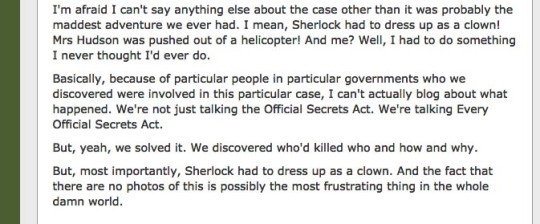
If Sherlock had been able to comment at this point, I think he would probably have questioned why John decided to write it down in the first place, just like he did before, when John hinted something about Irene Adler (X). According to John, that “adds context. Gives people an idea about the real you”. Which Sherlock also questions. And still, in TSoT, he does mention this ‘frustrating’ case in his best man speech at John's wedding...
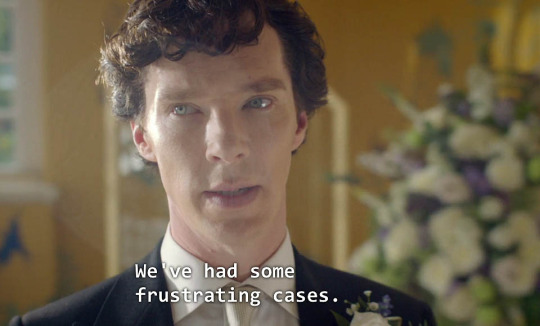
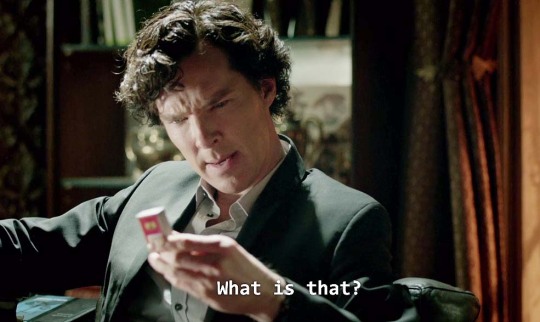


...which means that Sherlock - contrary to his usual opinion of this behaviour - did choose to share a glimpse of this case with the wedding guests in spite of it being, apparently, either ‘inexplicable’ or a top secret case of international importance (”We’re talking about Every Official Secrets Act”, according to John’s blog post). So here we have a clear teaser, in my opinion; a whole case that is merely hinted at, but it still appears in both the show and in John’s blog. But in neither of them are we actually told the solution.
So, parting from the conviction that nothing is inexplicable to Sherlock (which is confirmed by John’s blog telling us they did actually solve it), let's dissect this blog post, pice for piece! :) There's a number of objects and phenomena mentioned in this post that pop up frequently in the show, so let’s see what they might mean:
1. Matchboxes. In the picture from TSoT above, Sherlock looks like he’s being enlightened by the ‘inexplicable’ thing that’s in the matchbox. Might there be anything significant about matchboxes - like some sort of clue? There aren't actually many of them, except for the ones in the ‘inexplicable’ case, but they are at least mentioned in ASiB:
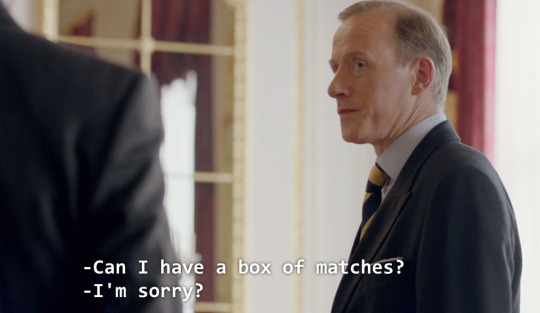
But since matchboxes are not so often used by smokers these days, we might as well also include lighters, right? Strange, by the way, that Sherlock would even ask for a matchbox before he asks for a lighter...

Either will do. So, on what occasions do we see Sherlock using a match or a lighter? Well, I’ve tried to collect the data, but since Sherlock apparently had quit smoking at the beginning of the show, we only ever see other characters using them before TSoT, which seems logical; he doesn’t need a lighter, since he has John Watson for a conductor of light. In ASiP there’s Jeff Hope’s pistol lighter. And later in ASiB, after Buckingham Palace, we see Sherlock smoke, but it’s Mycroft who lights his only cigarette. In THoB Henry Knight uses a lighter on his own cigarette, but Sherlock’s cigs are hidden behind the skull on the mantelpiece - ‘hidden’ on his own request apparently.

And in TEH Lestrade is holding a lighter to his cigarette the moment Sherlock returns from the dead, telling Lestrade that smoking will kill him. And that’s about it. And the lighters are all very ‘explicable’, as far as I can see. In HLV Sherlock is smoking again, though, in spite of being fresh home from hospital (no lighter in sight, though).
But then in TAB’s Victorian scenes and in TFP, there are indeed some matchboxes that seem to require explanations:
At 221B, when Lestrade comes to visit, Holmes lights his pipe with a match,

which transforms into Emilia Ricoletti’s pistol barrel:
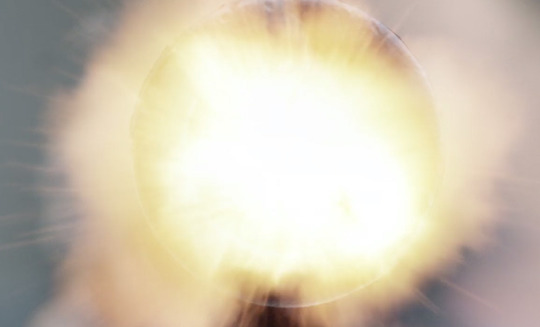
Is this significant in any way? Might be, but I don’t see it just yet. Need more data.
Later, in the Carmichael house, Holmes strikes a match to light a lantern, and tells Watson to stay in the hall. And then comes an interesting scene (my bolding - thanks for the quotes, Ariane De Vere).
Watson is supposedly speaking to the ghost of Emilia Ricoletti:
WATSON: You’re human, I know that. You must be. (It’s dark in the corridor. He puts his revolver onto a table beside him, on which is a candle and a box of matches. He picks up the latter.)
WATSON: Little use, us standing here in the dark. (He strikes a match and picks up the candle to light it.)
WATSON: After all, this is the nineteenth century.

That last remark is a curious one, isn’t it? As if they should be ‘enlightened’, since it’s the 19th century. But this is all happening inside 21st century Sherlock’s head, so why does he imagine Watson referring to Victorian times as ‘modern’ here? And Watson, who is usually addicted to danger, is now vacillating between being terrified by the supposed ghost and speaking to it as if repeating his recent conversation with Holmes about human ‘impulses’. Adding to the importance of this scene, it was also one of the selected scenes for the TAB trailer, IIRC.
Enlightenment seems to be a sort of theme, because in TFP John says it outright (to Mycroft):
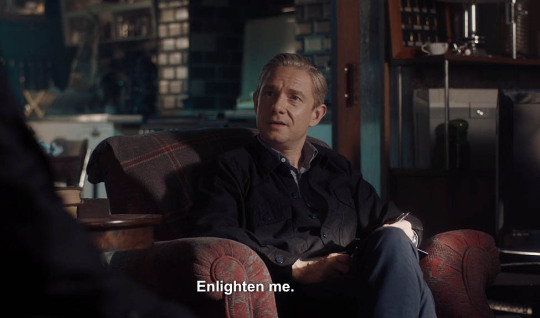
And then in TFP there’s a scene, voice-over by Mycroft, where little Euros is drawing family pictures, but on every one of them her brother Sherlock is dying a horrible death of some sort. (For some reason he also has red hair and is wearing the same yellow-and-blue-striped jumper).

Then she grabs a matchbox,
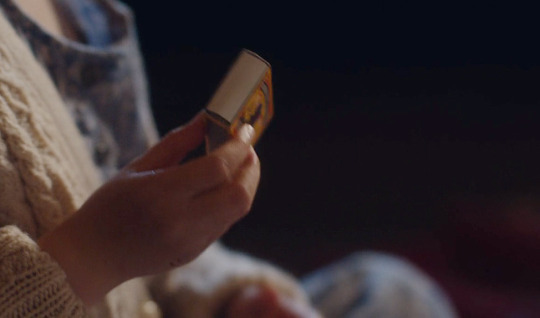
lights a match,

and then apparently sets the whole mansion of Musgrave Hall on fire. (We don’t actually see her doing this, though).
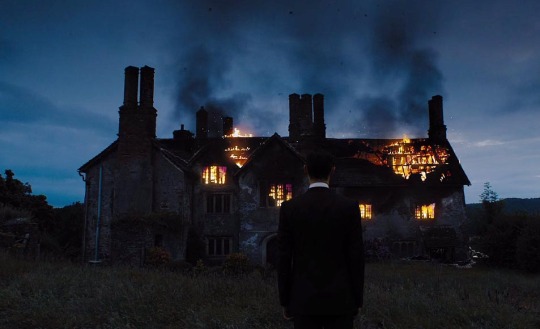
Now, that’s kind of an ‘inexplicable’ matchbox, isn’t it? Why did Euros do this? This reeks of Childhood Trauma to me. Since I actually doubt that Euros even exists (I think TFP is all happening in Sherlock’s mind, and Euros might represent a part of Sherlock himself) I do wonder what actually happened to Sherlock...
2. Isaac Persano. According to Sherlock in TSoT, he was a “French decathlete found completely out of his mind, surrounded by 1812 matchboxes, all empty except this one”. Apparently John (see blogpost above) couldn’t believe his eyes when Sherlock showed him the content of the matchbox. Persano had been missing for a year and a half, after the murder of his trainer. He was found in a hotel room in Brighton and couldn't speak. John diagnosed it as PTSD, but apparently Sherlock proved him wrong. The trainer had also been found in a hotel room, beaten to death with a heavy object.
Isn’t it a strange coincidence that first we have this missing person, Isaac Persano on the blog. And then we get Isaac Whitney in HLV, who is also ‘missing’ but later found in a drug den, together with Sherlock. Not to mention that his family name, Persano, sounds almost like Persona. As if someone would be impersonating someone else, right? Maybe someone who likes to use disguises?
3. Clowns. It’s mentioned twice in the blogpost that Sherlock had to dress up as a clown, so I assume it’s important. We never see Sherlock as a clown, though, but there’s two occasions in the show where someone else is dressed up as a clown. The first is the Waters gang in TSoT:
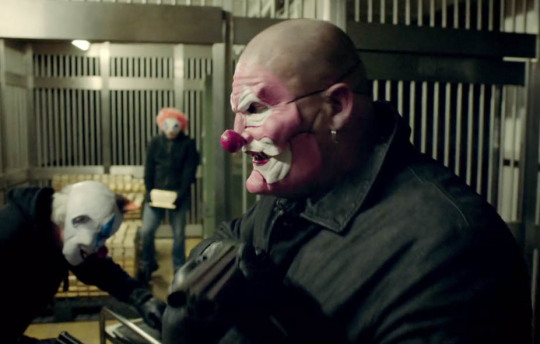
And the second is in TFP, in Mycroft’s house, where Sherlock apparently has hired a clown to scare his brother into telling him about Euros (which in itself seems extremely weird and illogical to me):
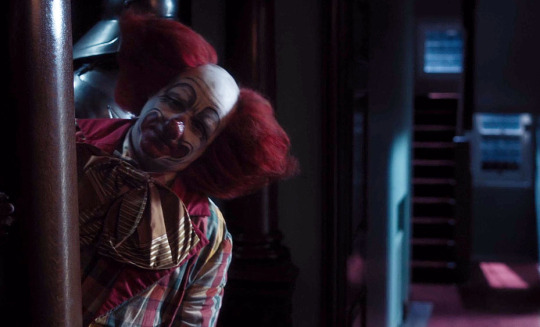
So none of these clowns are actually ‘real’ ones, who make people laugh, but rather acting to frighten people or using the outfit for disguise while comitting a crime. Hmm... Childhood trauma?
4. Helicopters. According to John, Mrs Hudson was thrown out of one (we have no idea how or why). Apart from this blogpost case (the helicopter sequence is not shown in Sherlock’s Best Man speech), there’s only one other occasion described by John: when he was “whisked away in a helicopter and taken to Buckingham Palace”. We also see this scene in the TV show. But there are plenty of other helicopters mentioned and/or shown in the TV show: Already in ASiP, Sherlock is talking of getting a police helicopter to track down the murderer. In TEH, Sherlock is chased by a helicopter in Serbia (we only ever hear the sound of it and see the grass move from its wind, though). Also in TEH, when Sherlock is telling John how he survived The Fall, he considered a helicopter rescue. In TSoT, Greg summons a police helicopter as backup when he thinks Sherlock is in danger at 221B. In HLV Sherlock and John are transported to Appledore in a helicopter. Then Mycroft also arrives in a helicopter (which looks suspiciously similar to Magnussen’s). The same helicopter is then shown in the manipulated footage at the top secret hearing in T6T. Then there’s the police helicopter in TLD, chasing Mrs Hudson’s red sports car.

Also in TLD, there’s a surveillance helicopter following Sherlock and Faith through the streets of London by night. And - last but not least - there are several helicopters heading for Sherrinford island in TFP. First there’s Jim’s ‘I want to break free’ helicopter. Then the one that transports Euros back to prison. And finally there’s the one that takes Sherlock out to Sherrinford to visit his sister, at least twice. If I haven’t miscalculated, that’s 14 helicopters in total. Quite a lot, isn’t it? Even more than one per episode...
5. Mrs Hudson being where she wouldn't likely bee. The idea of Mrs H being pushed out of a helicopter is very horrible indeed, but doesn’t actually make much sense to me. Is John really a reliable narrator here? Why would an old lady be pushed out of a helicopter? To harm Sherlock? Was it the CIA-guy’s revenge? Or did it have something to do with her past in the drug-dealing business? And if she was pushed out, how did she survive? Was the helicopter parked on the ground? Too many questions here (and too many helicopters as well, I’d say). But then again, we have this remarkable scene in TLD, where Hudders is speeding a red Aston Martin with Sherlock in the boot, being chased by the police.
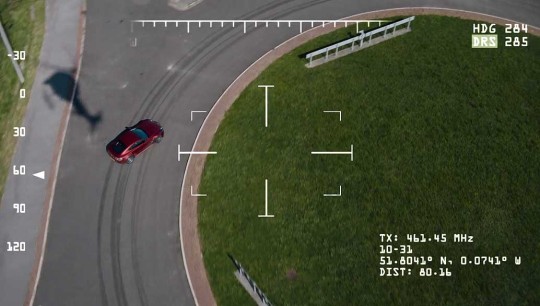
So apparently we can now expect just about anything from her, on any location...
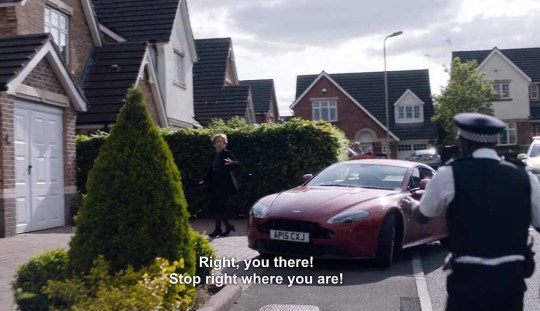
Another strange thing about Hudder’s car is the registration plate; why on earth would it have the scientific genus name of the Honey bee (Apis mellifera) on it? Hmm...
6. John doing something he never thought he'd ever do. Well, here I’m totally lost. Unless... Well, from HLV and onwards, I think John has actually been doing lots of things I never thought I’d ever see John Watson do. Like beating up a junkie for no specific reason. Or having a go at Sherlock while he might be dying from a re-opened gunshot in the chest. Or forgiving his wife while knowing that she almost murdered Sherlock. Or blaming Sherlock for her death, without even having seen what happened. Or - worst of all - assaulting Sherlock, kicking him on the ground, when he’s very obviously high on drugs. So yes - that prediction does make sense, thinking about it.
Comment section. Apart from the actual content of John’s blogpost, there’s also the comment section:
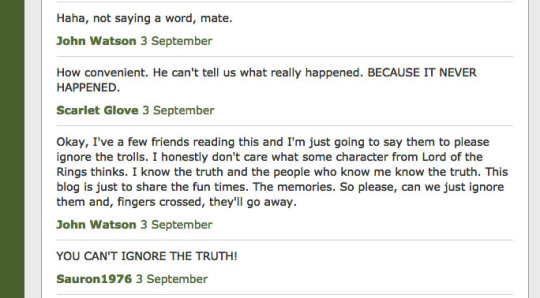
Sauron!? What’s this - an in-joke as a nod to the actor who plays The Hobbit? :) In a show that is also frequented by ‘dragon-slayers’... ;) Jokes aside, these two commenters - ‘Sauron1976′ and ‘Scarlet Glove’ - have been hating on John’s blog about Sherlock more or less since he ‘died’. ‘Scarlet Glove’, however, who is claiming that The Inexplicable Matchbox events never happened, makes me think that this name might be a clue - some sort of ‘red herring’, maybe telling us that HLV-S4 actually didn’t happen in the ‘real’ world?
So, in summary, I think there’s a lot of foreshadowing for the rest of the show in this blogpost about the Inexplicable Matchbox. At first sight, S4 was rather ‘inexplicable’ to me. But I feel sure that before the show is over (which it isn’t yet), most of the weirdness actually will be explained.
Tagging some people who might be interested: @sarahthecoat @raggedyblue @ebaeschnbliah @gosherlocked @tjlcisthenewsexy @monikakrasnorada @sagestreet @fellshish @tendergingergirl @sherlockshadow
57 notes
·
View notes